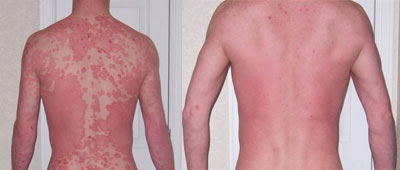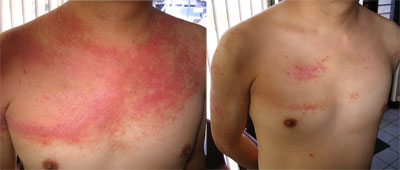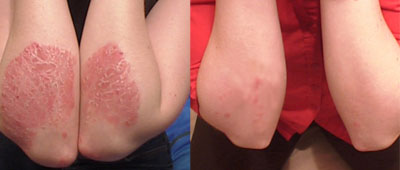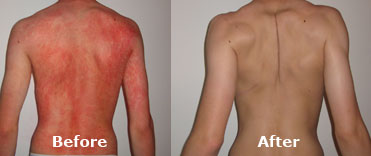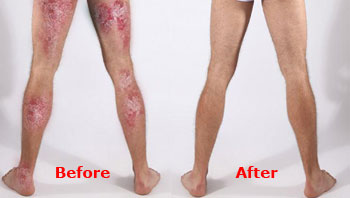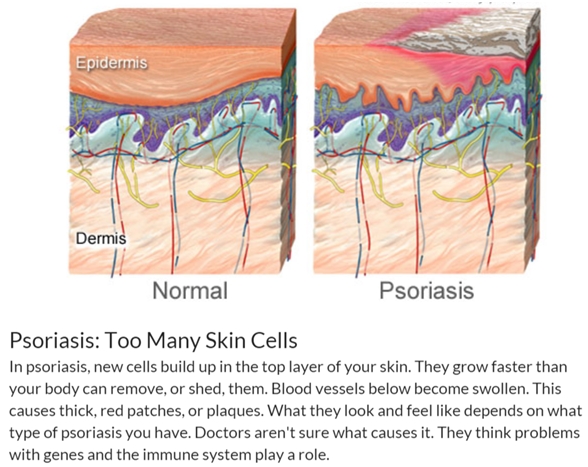

Psoriasis is a long-lasting autoimmune disease characterized by patches of abnormal skin.These skin patches are typically red, itchy, and scaly. They may vary in severity from small and localized to complete body coverage.Injury to the skin can trigger psoriatic skin changes at that spot, which is known as Koebner phenomenon.
There are five main types of psoriasis: plaque, guttate, inverse, pustular, and erythrodermic.Plaque psoriasis, also known as psoriasis vulgaris, makes up about 90% of cases. It typically presents with red patches with white scales on top. Areas of the body most commonly affected are the back of the forearms, shins, around the navel, and the scalp.Guttate psoriasis has drop-shaped lesions.Pustular psoriasis presents with small non-infectious pus-filled blisters.Inverse psoriasis forms red patches in skin folds.Erythrodermic psoriasis occurs when the rash becomes very widespread, and can develop from any of the other types. Fingernails and toenails are affected in most people at some point in time. This may include pits in the nails or changes in nail colour.
Psoriasis is generally thought to be a genetic disease which is triggered by environmental factors.In twin studies,identical twins are three times more likely to both be affected compared to non-identical twins; this suggests that genetic factors predispose to psoriasis. Symptoms often worsen during winter and with certain medications such asbeta blockers or NSAIDs.Infections and psychological stress may also play a role.Psoriasis is not contagious. The underlying mechanism involves the immune system reacting to skin cells. Diagnosis is typically based on the signs and symptoms.
There is no cure for psoriasis. However, various treatments can help control the symptoms.These treatments may include steroid creams, vitamin D3 cream, ultraviolet light, and immune system suppressing medications such asmethotrexate.About 75% of cases can be managed with creams alone.The disease affects 2–4% of the population.Men and women are affected with equal frequency.The disease may begin at any age.Psoriasis is associated with an increased risk of psoriatic arthritis, lymphomas, cardiovascular disease, Crohn's disease, and depression.Psoriatic arthritis affects up to 30% of individuals with psoriasis. Contents
.jpg)
Psoriasis is classified as a papulosquamous disorder and is most commonly subdivided into different categories based on histological characteristics.Variants include plaque, pustular, guttate, and flexural psoriasis. Each form has a dedicated ICD-10 code.Psoriasis can also be classified into nonpustular and pustulartypes
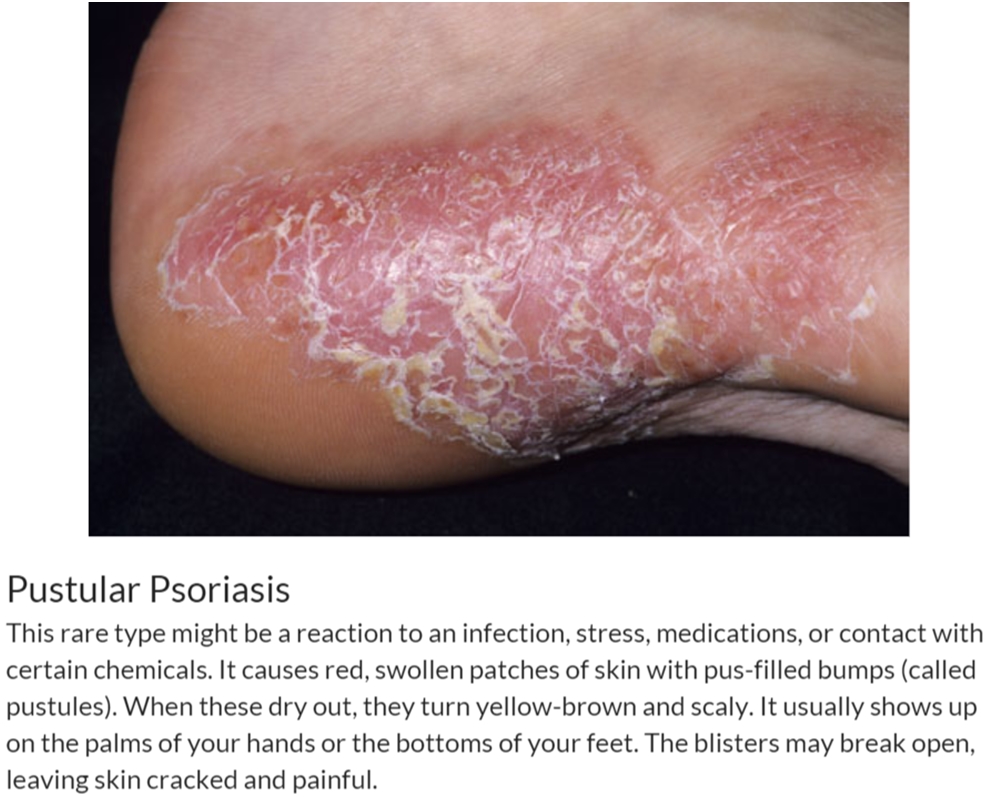

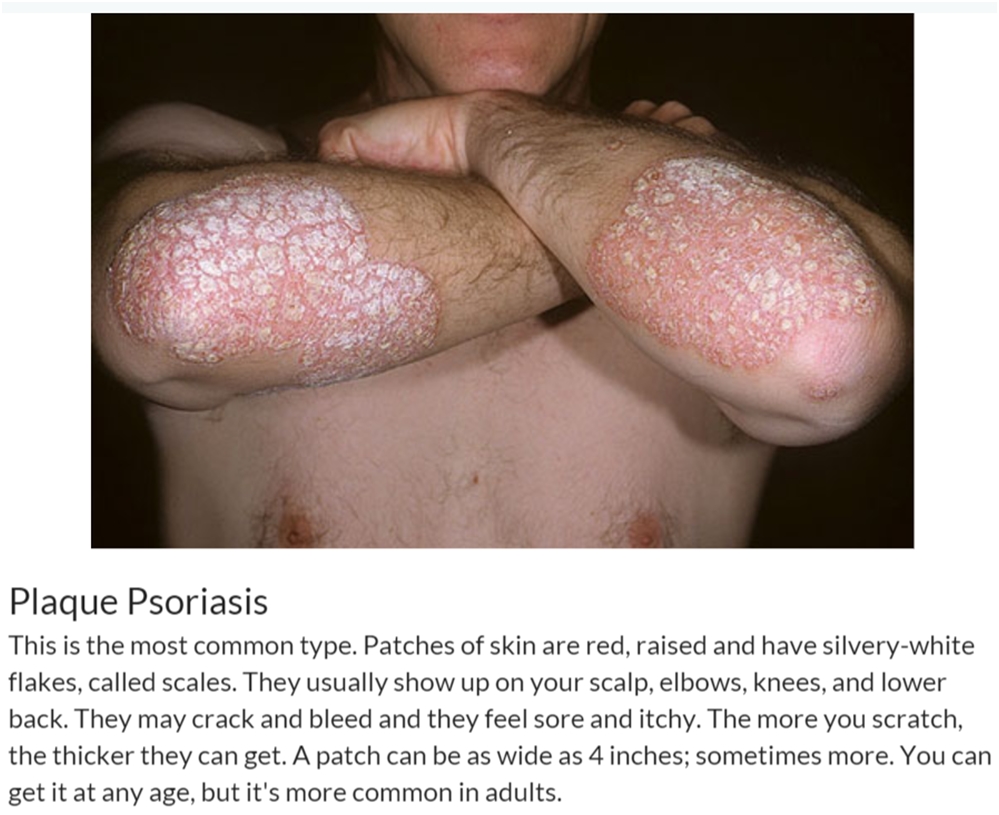
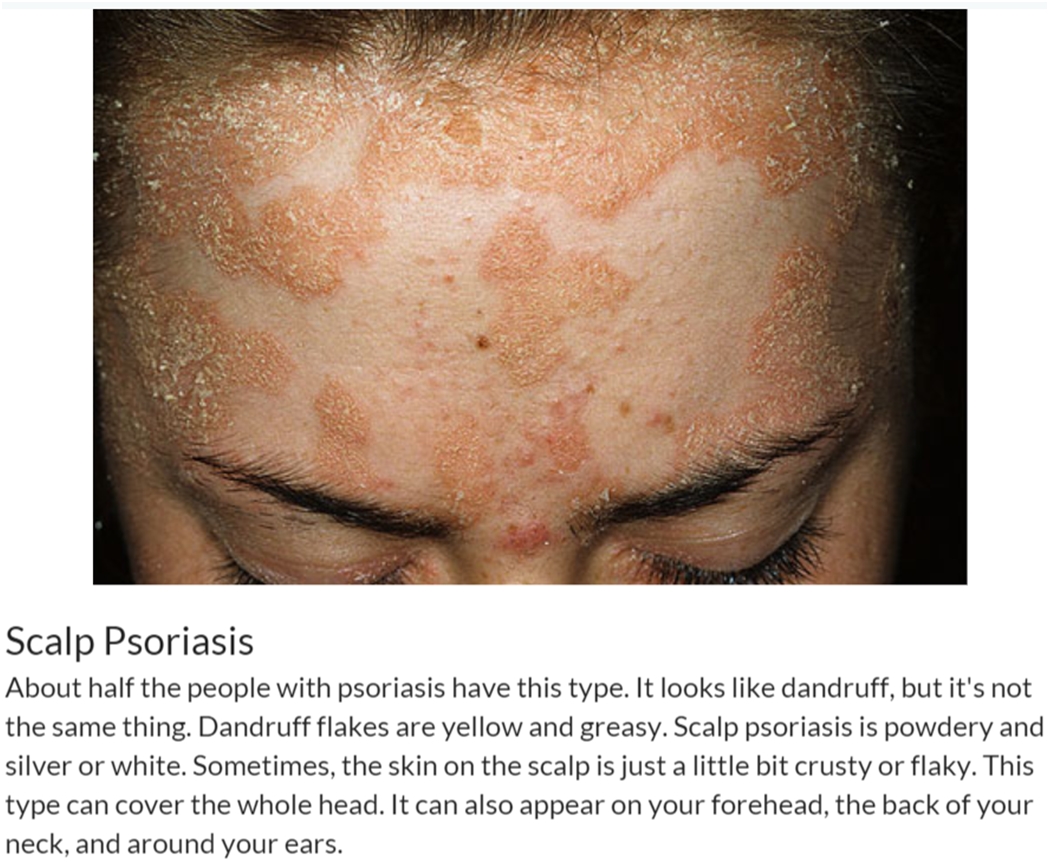
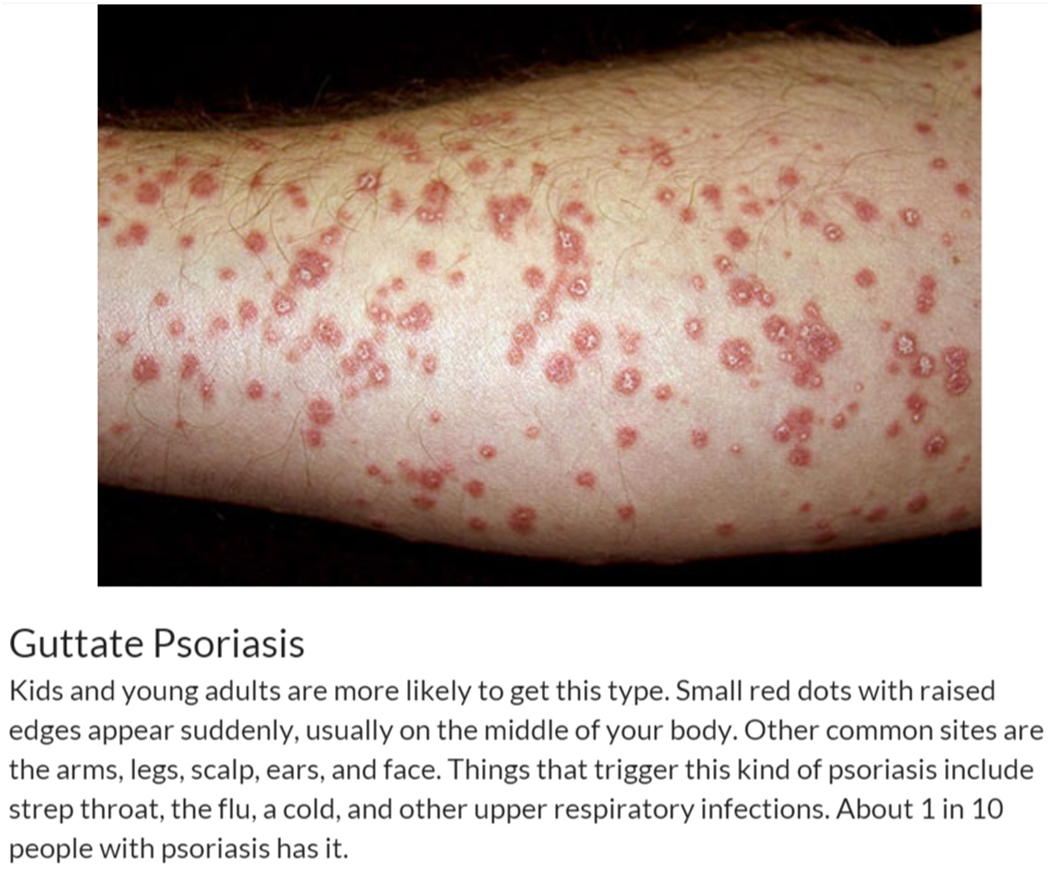


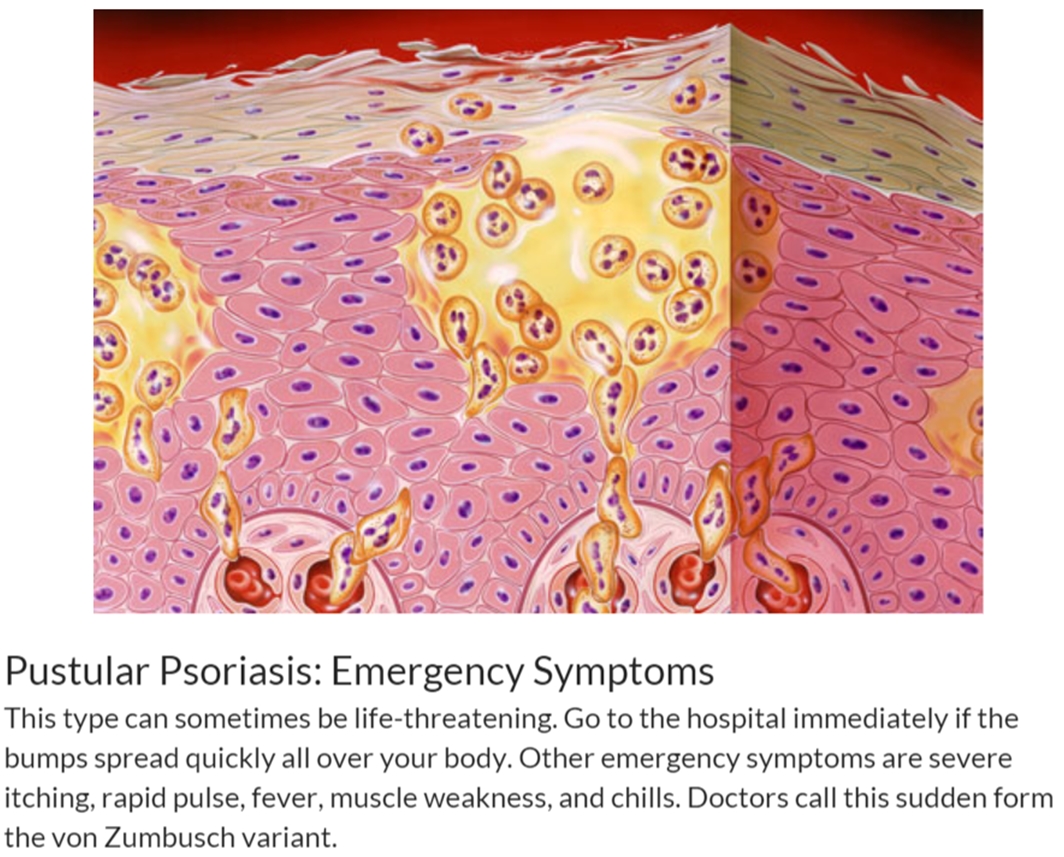
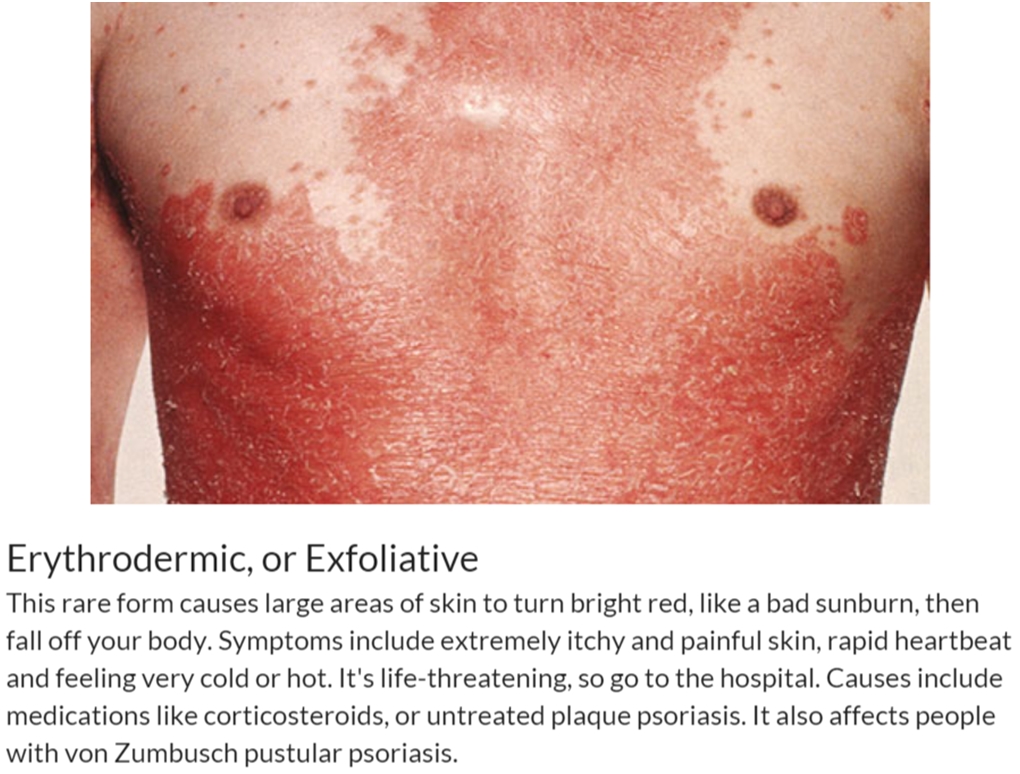
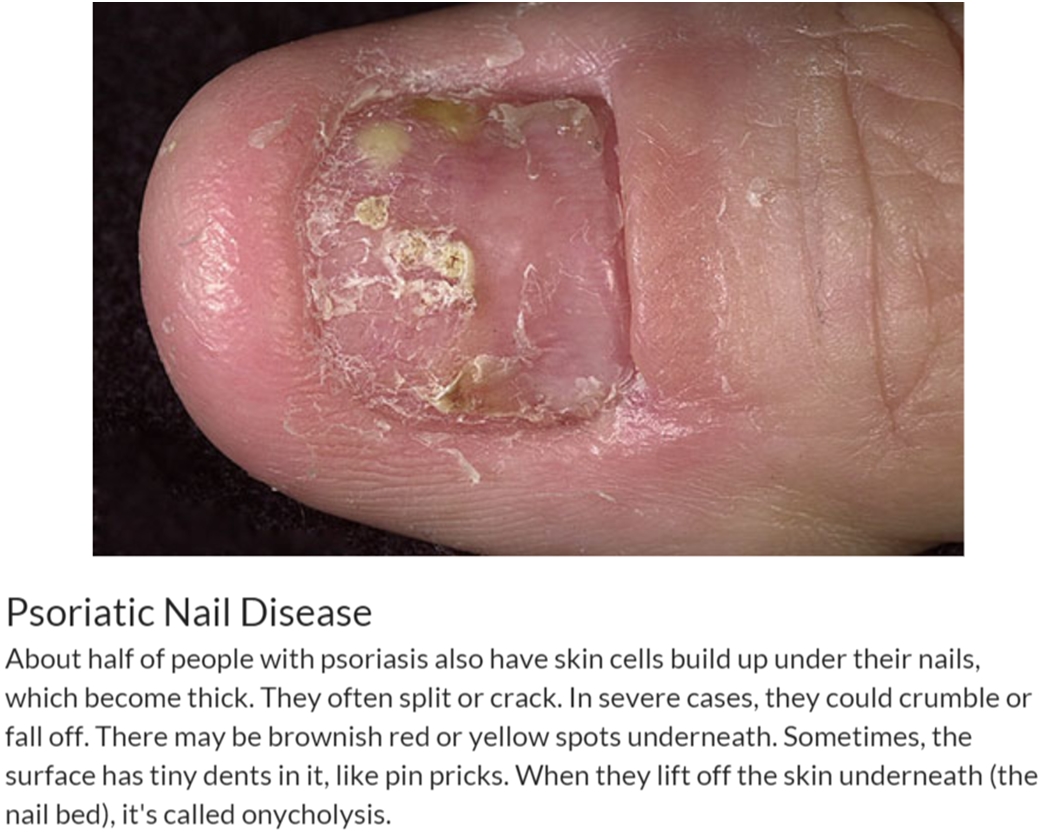
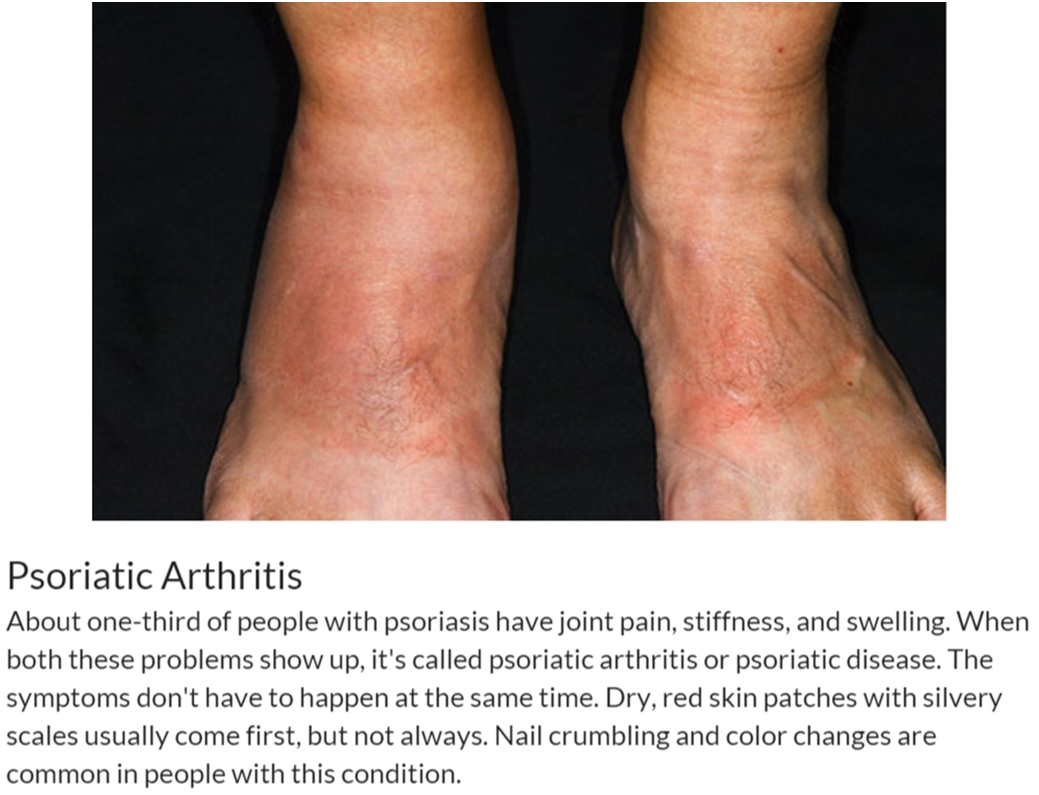
Another classification scheme considers genetic and demographic factors. Type 1 has a positive family history, starts before the age of 40, and is associated with thehuman leukocyte antigen, HLA-Cw6. Conversely, type 2 does not show a family history, presents before age 40, and is not associated with HLA-Cw6.Type 1 accounts for about 75% of persons with psoriasis.
The classification of psoriasis as an autoimmune disease has sparked considerable debate. Researchers have proposed differing descriptions of psoriasis and psoriatic arthritis; some authors have classified them as autoimmune diseases while others have classified them as distinct from autoimmune diseases and referred to them as immune-mediated inflammatory diseases.
There is no consensus about how to classify the severity of psoriasis. Mild psoriasis has been defined as a percentage of body surface area (BSA)≤10, a Psoriasis Area Severity Index (PASI) score ≤10, and a dermatology life quality index (DLQI) score ≤10.Moderate to severe psoriasis was defined by the same group as BSA >10 or PASI score >10 and a DLQI score >10.The DLQI is a 10 question tool used to measure the impact of several dermatologic diseases on daily functioning. The DLQI score ranges from 0 (minimal impairment) to 30 (maximal impairment) and is calculated with each answer being assigned 0–3 points with higher scores indicating greater social or occupational impairment.
The psoriasis area severity index (PASI) is the most widely used measurement tool for psoriasis. PASI assesses the severity of lesions and the area affected and combines these two factors into a single score from 0 (no disease) to 72 (maximal disease).Nevertheless, the PASI can be too unwieldy to use outside of research settings, which has led to attempts to simplify the index for clinical use.

Psoriasis vulgaris (also known as chronic stationary psoriasis or plaque-like psoriasis) is the most common form and affects 85%–90% of people with psoriasis.Plaque psoriasis typically appears as raised areas of inflamed skin covered with silvery-white scaly skin.These areas are called plaques and are most commonly found on the elbows, knees, scalp, and back.Psoriatic erythroderma (erythrodermic psoriasis) involves widespread inflammation and exfoliation of the skin over most of the body surface. It may be accompanied by severe itching, swelling, and pain. It is often the result of an exacerbation of unstable plaque psoriasis, particularly following the abrupt withdrawal of systemic glucocorticoids.This form of psoriasis can be fatal as the extreme inflammation and exfoliation disrupt the body's ability to regulate temperature and perform barrier functions.
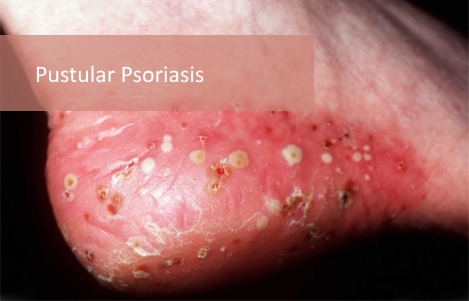
Pustular psoriasis appears as raised bumps filled with noninfectious pus (pustules).The skin under and surrounding the pustules is red and tender.Pustular psoriasis can be localized, commonly to the hands and feet (palmoplantarpustulosis), or generalized with widespread patches occurring randomly on any part of the body. Acrodermatitis continua is a form of localized psoriasis limited to the fingers and toes that may spread to the hands and feet.Pustulosispalmarisetplantaris is another form of localized pustular psoriasis similar to acrodermatitis continua with pustules erupting from red, tender, scaly skin found on the palms of the hands and the soles of the feet.
Generalized pustular psoriasis (pustular psoriasis of von Zumbusch), also known as impetigo herpetiformis during pregnancy,is a rare and severe form of psoriasis that may require hospitalization. The development of generalized pustular psoriasis is often caused by an infection, abrupt withdrawal of topical corticosteroid treatment, pregnancy, hypocalcemia, medications, or following an irritating topical treatment for plaque psoriasis.This form of psoriasis is characterized by an acute onset of numerous pustules on top of tender red skin. This skin eruption is often accompanied by a fever, muscle aches, nausea, and an elevated white blood cell count.Annular pustular psoriasis (APP), a rare form of generalized pustular psoriasis, is the most common type seen during childhood.APP tends to occur in women more frequently than in men, and is usually less severe than other forms of generalized pustular psoriasis such as impetigo herpetiformis.This form of psoriasis is characterized by ring-shaped plaques with pustules around the edges and yellow crusting.APP most often affects the torso, neck, arms, and legs.
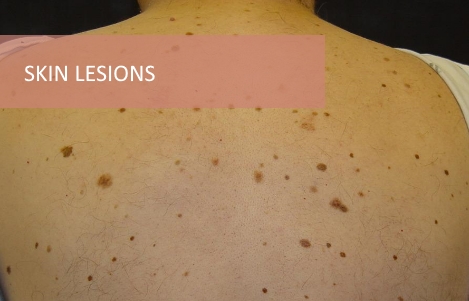
Additional types of psoriasis affecting the skin include inverse psoriasis, guttate psoriasis, oral psoriasis, and seborrheic-like psoriasis.
Inverse psoriasis (also known as flexural psoriasis) appears as smooth, inflamed patches of skin. The patches frequently affectskin folds, particularly around the genitals (between the thigh and groin), the armpits, in the skin folds of an overweight abdomen (known as panniculus), between the buttocks in the intergluteal cleft, and under the breasts in the inframammary fold. Heat, trauma, and infection are thought to play a role in the development of this atypical form of psoriasis. Napkin psoriasisis a subtype of psoriasis common in infants characterized by red papules with silver scale in the diaper area that may extend to the torso or limbs.Napkin psoriasis is often misdiagnosed as napkin dermatitis (diaper rash).
Guttate psoriasis is characterized by numerous small, scaly, red or pink, droplet-like lesions (papules). These numerous spots of psoriasis appear over large areas of the body, primarily the trunk, but also the limbs and scalp. Guttate psoriasis is often triggered by a streptococcal infection, typically streptococcal pharyngitis.The reverse is not true.
Oral psoriasis is very rare,In contrast to lichen planus, another common papulosquamous disorder that commonly involves both the skin and mouth. When psoriasis involves the oral mucosa (the lining of the mouth), it may be asymptomatic,but it may appear as white or grey-yellow plaques.Fissured tongue is the most common finding in those with oral psoriasis and has been reported to occur in 6.5–20% of people with psoriasis affecting the skin. The microscopic appearance of oral mucosa affected by geographic tongue (migratory stomatitis) is very similar to the appearance of psoriasis.However, modern studies have failed to demonstrate any link between the two conditions.
Seborrheic-like psoriasis is a common form of psoriasis with clinical aspects of psoriasis and seborrheic dermatitis, and may be difficult to distinguish from the latter. This form of psoriasis typically manifests as red plaques with greasy scales in areas of higher sebum production such as the scalp, forehead, skin folds next to the nose, skin surrounding the mouth, skin on the chest above the sternum, and in skin folds.

Psoriatic arthritis is a form of chronic inflammatory arthritis that has a highly variable clinical presentation and frequently occurs in association with skin and nail psoriasis.It typically involves painful inflammation of the joints and surrounding connective tissue and can occur in any joint, but most commonly affects the joints of the fingers and toes. This can result in a sausage-shaped swelling of the fingers and toes known as dactylitis.Psoriatic arthritis can also affect the hips, knees, spine (spondylitis), and sacroiliac joint (sacroiliitis).About 30% of individuals with psoriasis will develop psoriatic arthritis.Skin manifestations of psoriasis tend to occur before arthritic manifestations in about 75% of cases.

Psoriasis can affect the nails and produces a variety of changes in the appearance of finger and toe nails. Nail psoriasis occurs in 40–45% of people with psoriasis affecting the skin and has a lifetime incidence of 80–90% in those with psoriatic arthritis.These changes include pitting of the nails (pinhead-sized depressions in the nail is seen in 70% with nail psoriasis), whitening of the nail, small areas of bleeding from capillaries under the nail, yellow-reddish discoloration of the nails known as the oil drop or salmon spot, thickening of the skin under the nail (subungual hyperkeratosis), loosening and separation of the nail (onycholysis), and crumbling of the nail.
In addition to the appearance and distribution of the rash, specific medical signs may be used by medical practitioners to assist with diagnosis. These may include Auspitz's sign (pinpoint bleeding when scale is removed), Koebner phenomenon (psoriatic skin lesions induced by trauma to the skin),and itching and pain localized to papules and plaques.
Around one-third of people with psoriasis report a family history of the disease, and researchers have identified genetic lociassociated with the condition. Identical twin studies suggest a 70% chance of a twin developing psoriasis if the other twin has the disorder. The risk is around 20% for nonidentical twins. These findings suggest both a genetic susceptibility and an environmental response in developing psoriasis.
Psoriasis has a strong hereditary component, and many genes are associated with it, but it is unclear how those genes work together. Most of the identified genes relate to the immune system, particularly the major histocompatibility complex (MHC) andT cells. Genetic studies are valuable due to their ability to identify molecular mechanisms and pathways for further study and potential drug targets.
Classic genome-wide linkage analysis has identified nine loci on different chromosomes associated with psoriasis. They are called psoriasis susceptibility 1 through 9 (PSORS1 through PSORS9). Within those loci are genes on pathways that lead to inflammation. Certain variations (mutations) of those genes are commonly found in psoriasis.Genome-wide association scans have identified other genes that are altered to characteristic variants in psoriasis. Some of these genes express inflammatory signal proteins, which affect cells in the immune system that are also involved in psoriasis. Some of these genes are also involved in other autoimmune diseases.
The major determinant is PSORS1, which probably accounts for 35%–50% of psoriasis heritability.It controls genes that affect the immune system or encode skin proteins that are overabundant with psoriasis. PSORS1 is located on chromosome 6 in the major histocompatibility complex (MHC), which controls important immune functions. Three genes in the PSORS1 locus have a strong association with psoriasis vulgaris: HLA-C variant HLA-Cw6,which encodes a MHC class I protein;CCHCR1, variant WWC, which encodes a coiled protein that is overexpressed in psoriatic epidermis; and CDSN, variant allele 5, which encodes corneodesmosin, a protein which is expressed in the granular and cornified layers of the epidermis and upregulated in psoriasis.
Two major immune system genes under investigation are interleukin-12 subunit beta (IL12B) on chromosome 5q, which expresses interleukin-12B; and IL23R on chromosome 1p, which expresses the interleukin-23 receptor, and is involved in T cell differentiation. Interleukin-23 receptor and IL12B have both been strongly linked with psoriasis.T cells are involved in the inflammatory process that leads to psoriasis.These genes are on the pathway that up-regulate tumor necrosis factor-α and nuclear factor κB, two genes involved in inflammation.Recently, the first gene directly linked to psoriasis has been identified. A rare mutation in the gene encoding for the CARD14 protein plus an environmental trigger was enough to cause plaque psoriasis (the most common form of psoriasis).
Conditions reported as accompanying a worsening of the disease include chronic infections, stress, and changes in season and climate.Others include hot water, scratching psoriasis skin lesions, skin dryness, excessive alcohol consumption, cigarette smoking, and obesity.
The rate of psoriasis in HIV-positive individuals is comparable to that of HIV-negative individuals, however, psoriasis tends to be more severe in people infected withHIV.A much higher rate of psoriatic arthritis occurs in HIV-positive individuals with psoriasis than in those without the infection.The immune response in those infected with HIV is typically characterized by cellular signals from Th2 subset of CD4+ helper T cells,whereas the immune response in psoriasis vulgaris is characterized by a pattern of cellular signals typical of Th1 subset of CD4+ helper T cells and Th17 helper T cells.It is hypothesized that the diminished CD4+-T cell presence causes an overactivation of CD8+-T cells, which are responsible for the exacerbation of psoriasis in HIV-positive people. Psoriasis in those with HIV/AIDS is often severe and may be untreatable with conventional therapy.
Psoriasis has been described as occurring after strep throat, and may be worsened by skin or gut colonization with Staphylococcus aureus, Malassezia, and Candida albicans.
Drug-induced psoriasis may occur with beta blockers,lithium,antimalarial medications,non-steroidal anti-inflammatory drugs,terbinafine, calcium channel blockers, captopril, glyburide, granulocyte colony-stimulating factor,interleukins, interferons, lipid-lowering drugs,197 and paradoxically TNF inhibitors such as infliximab or adalimumab.Withdrawal of corticosteroids (topical steroid cream) can aggravate psoriasis due to the rebound effect.
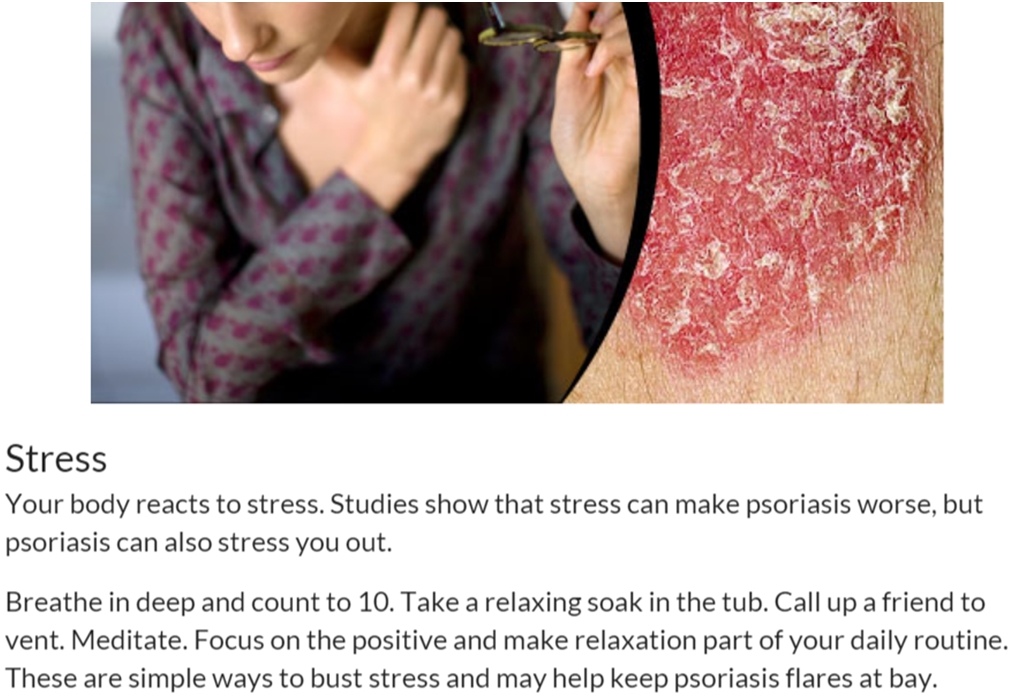
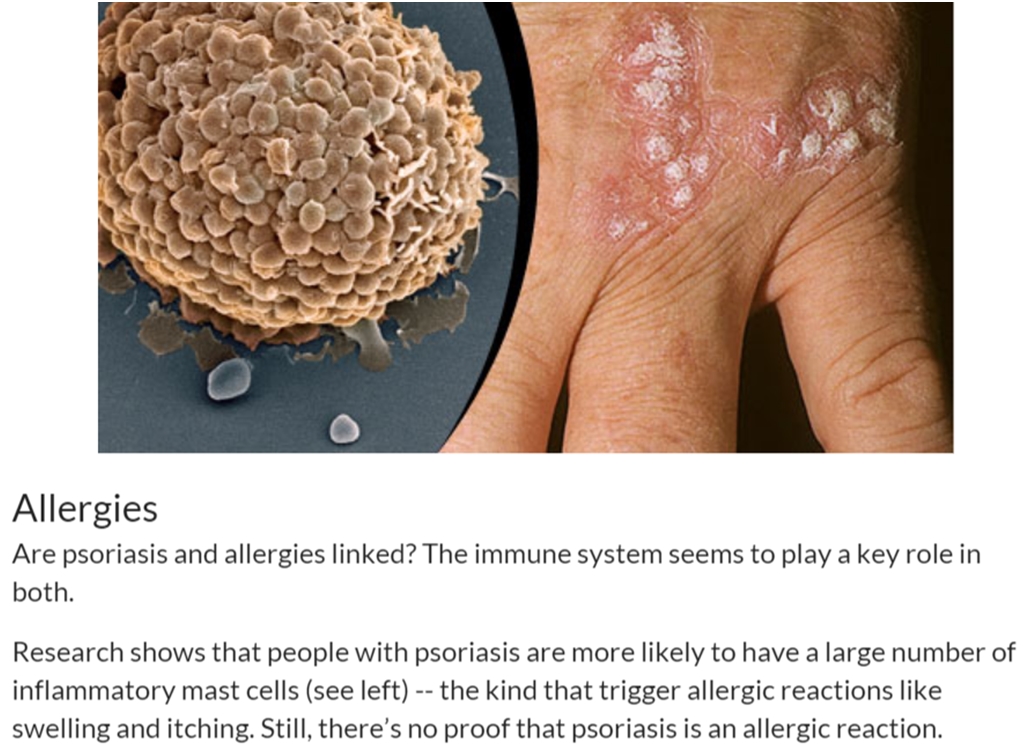
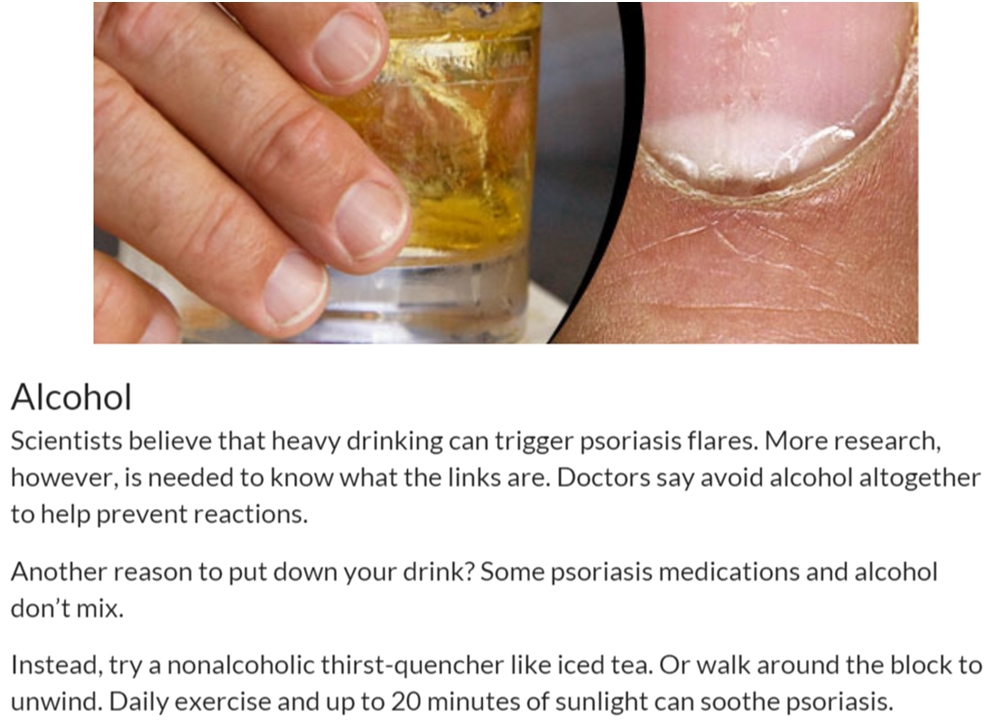
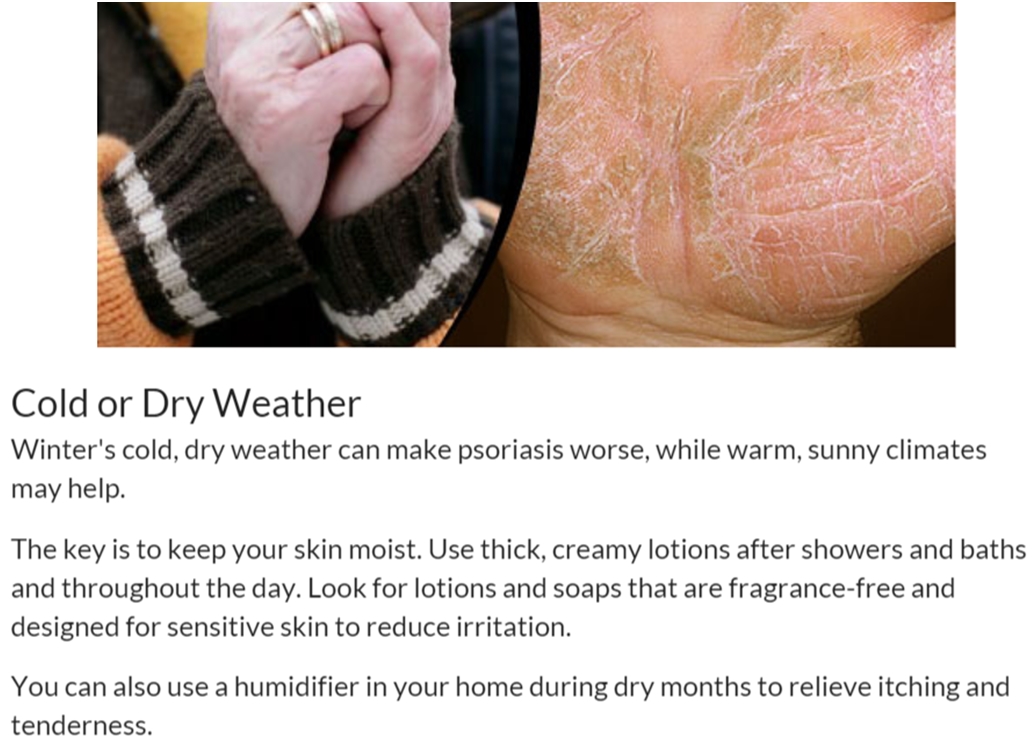
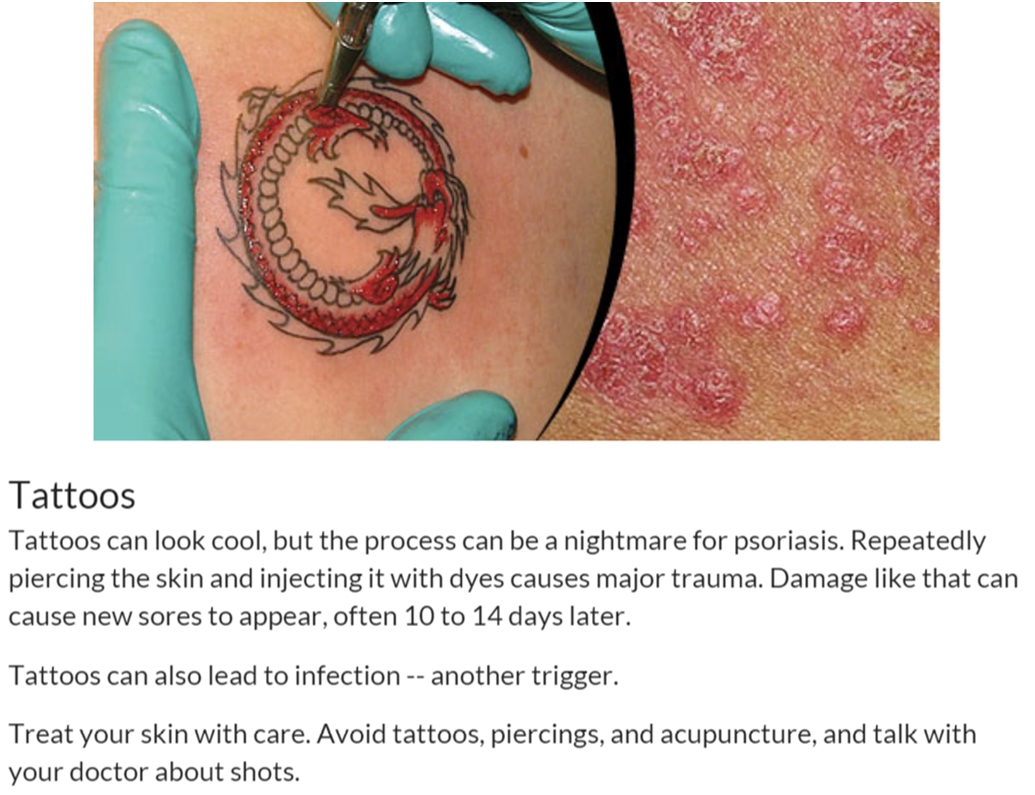
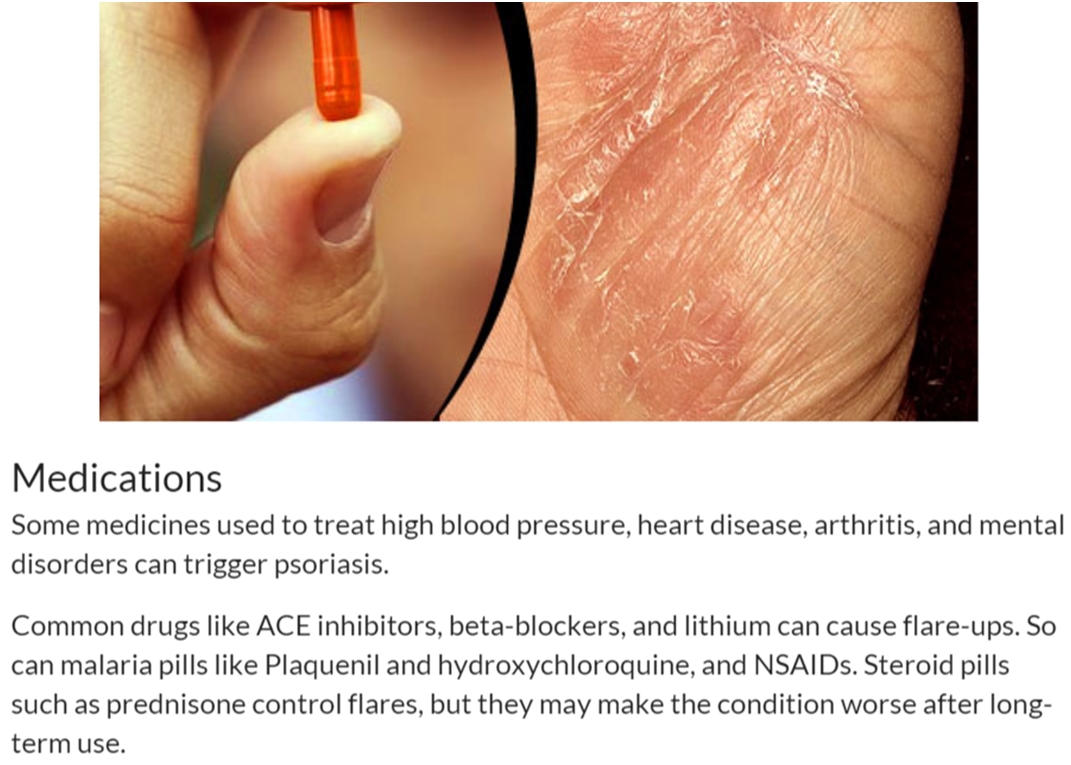
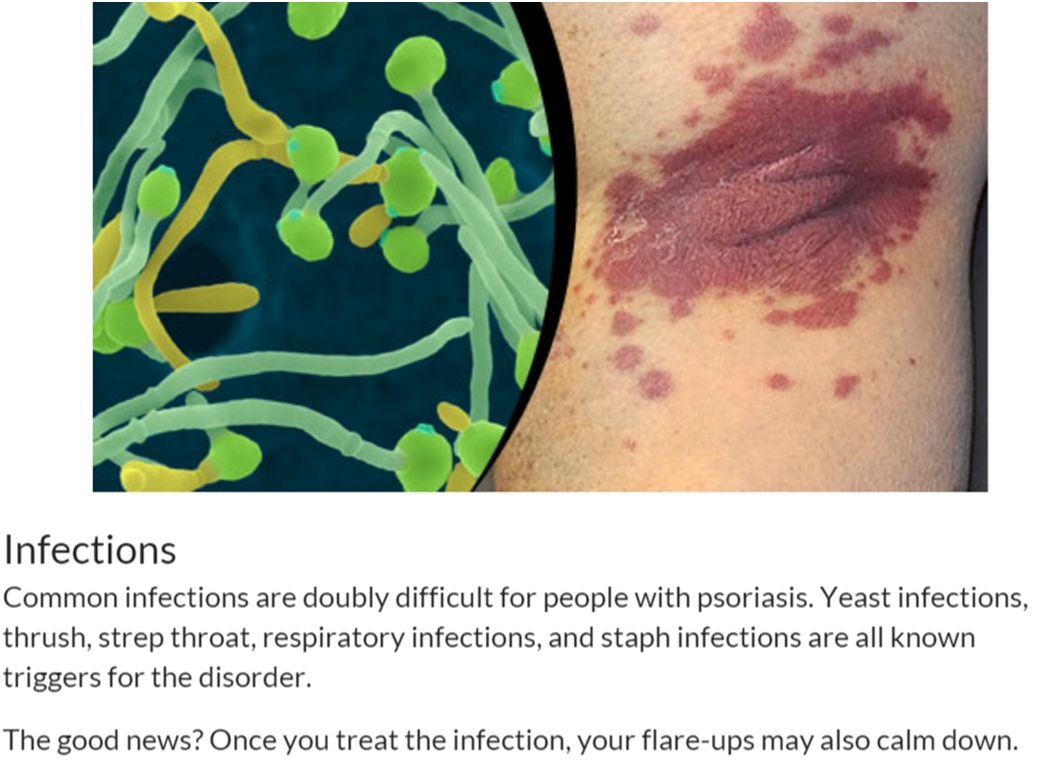
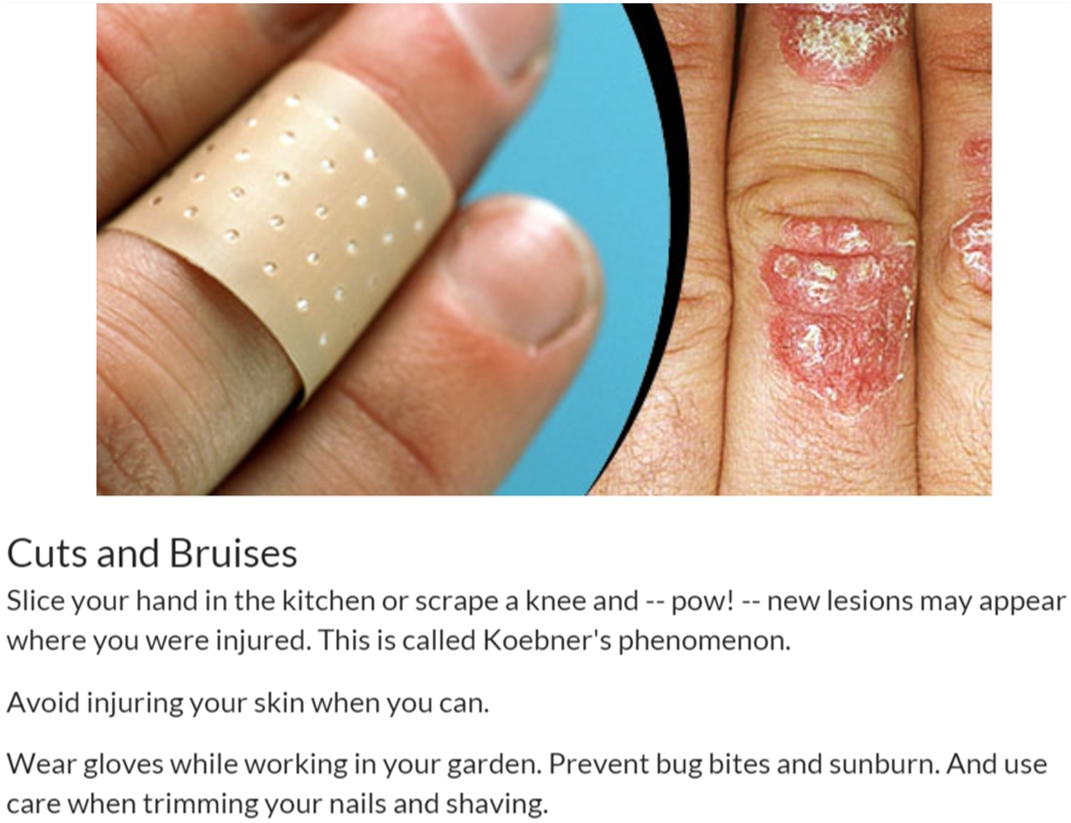
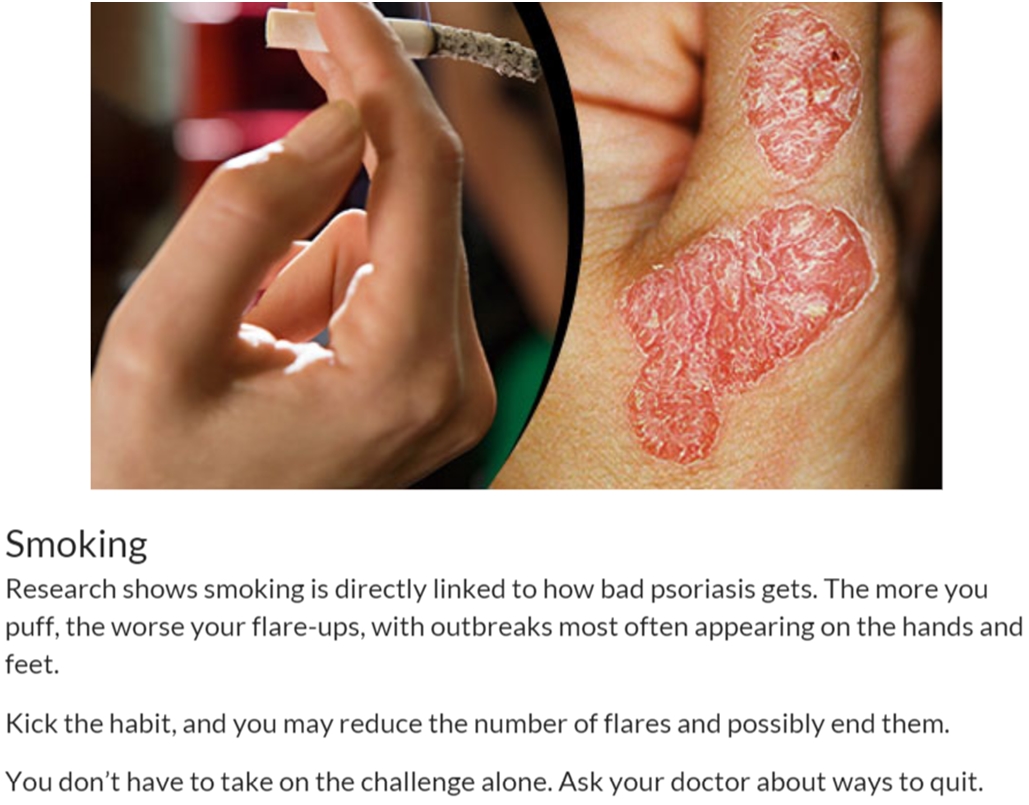
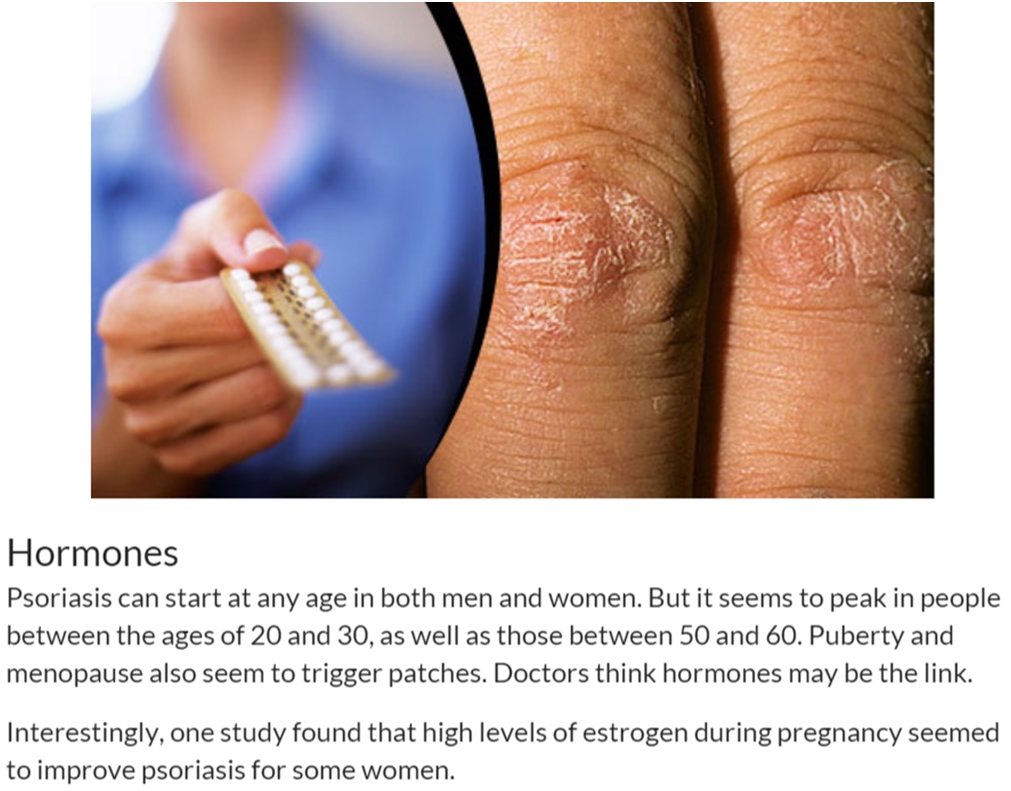
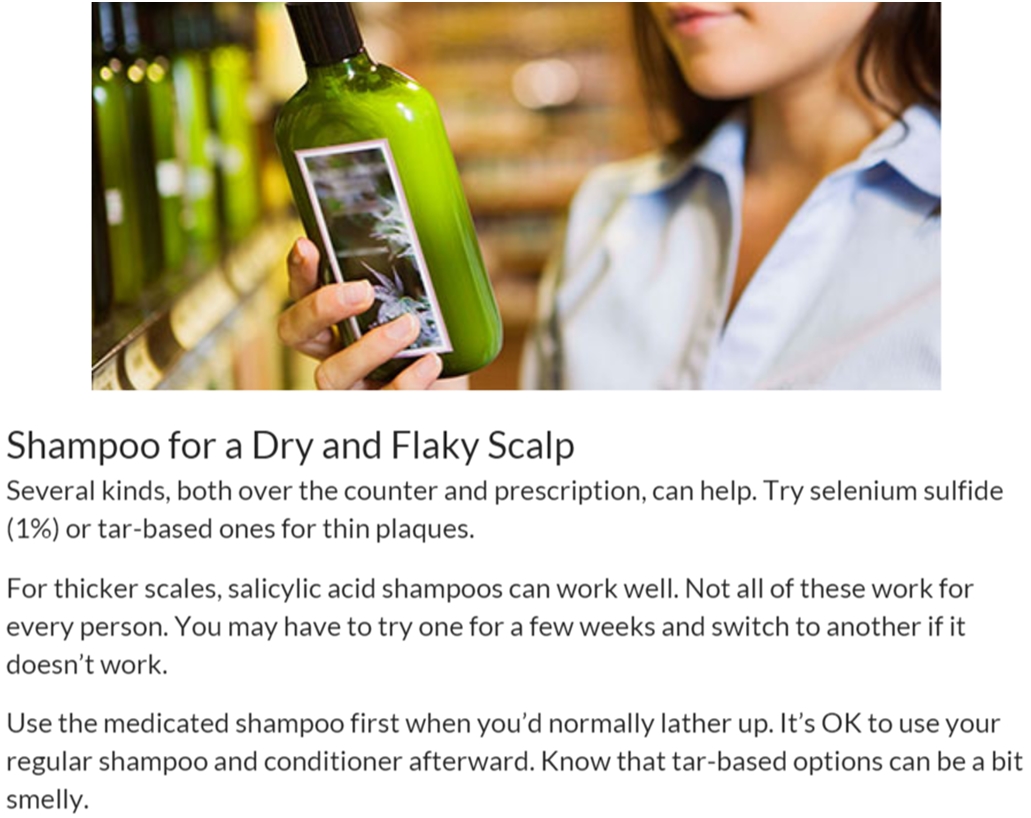
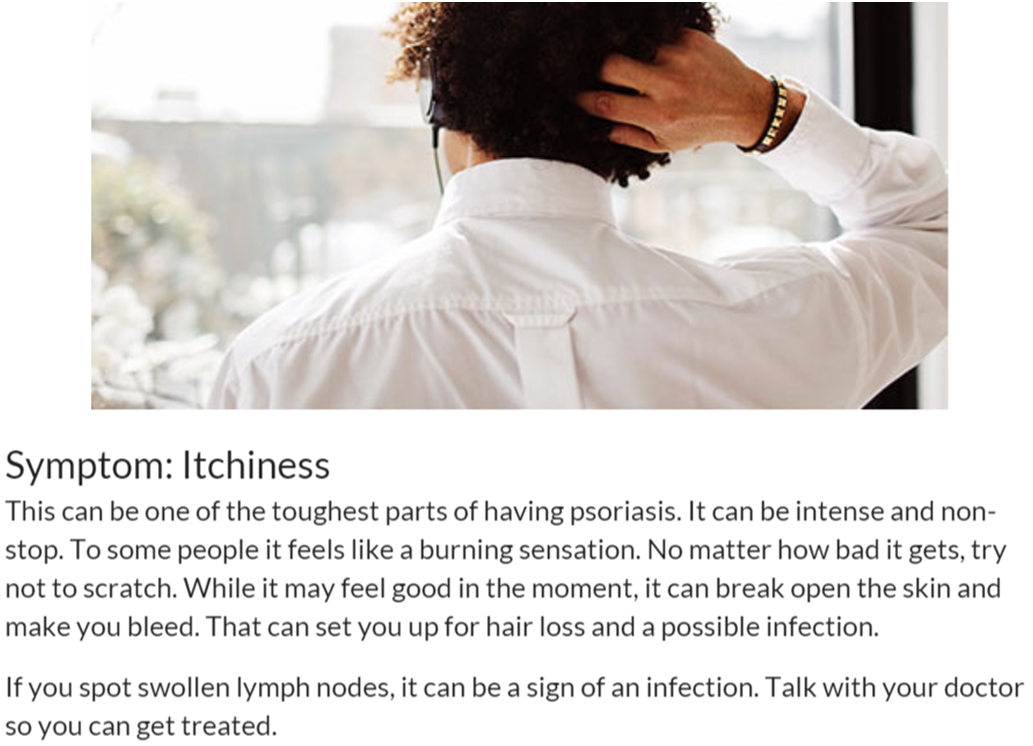
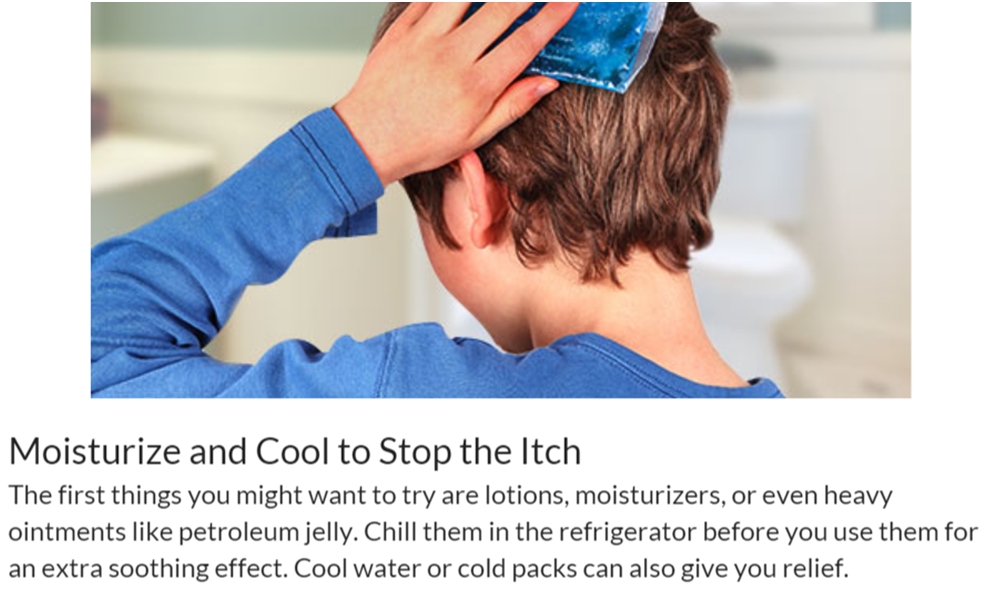
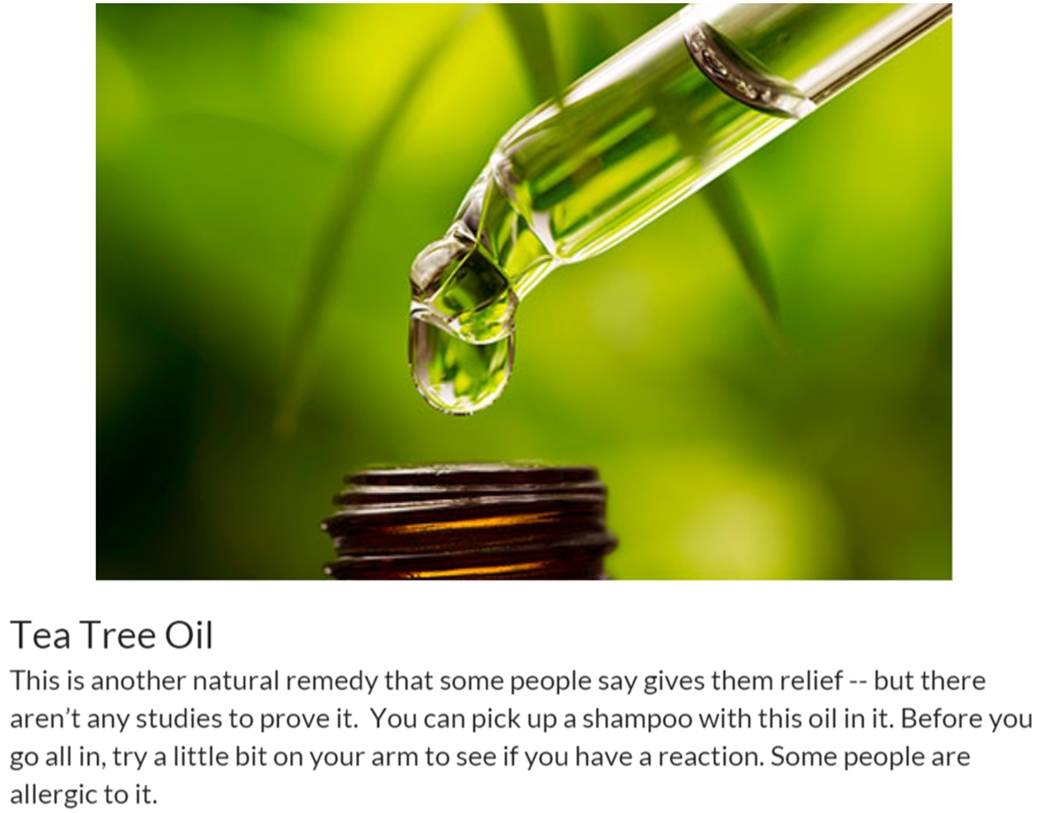
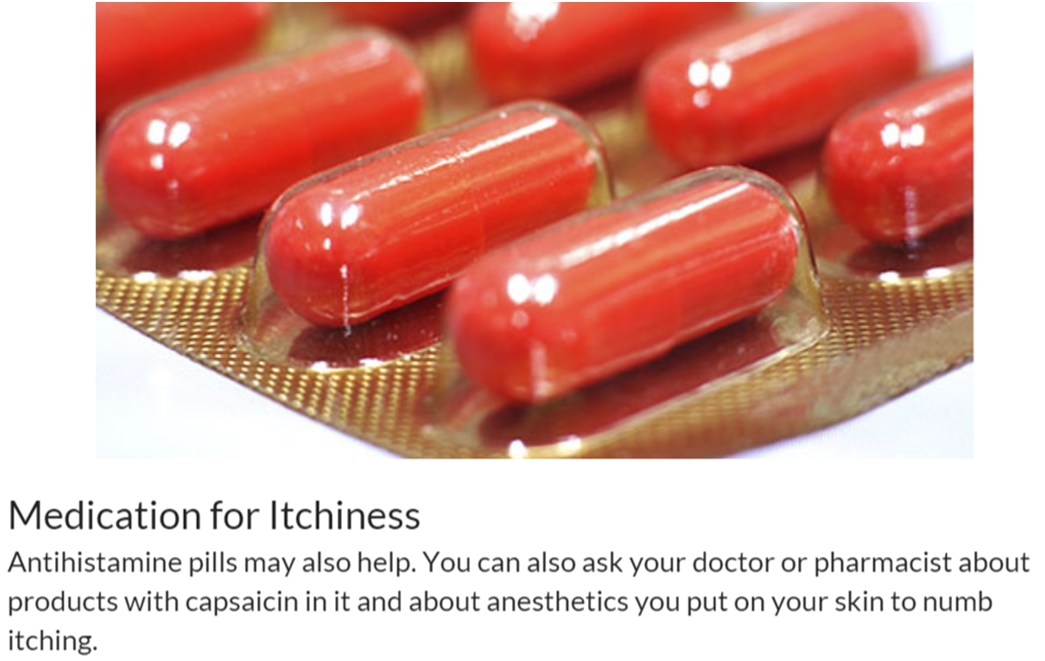
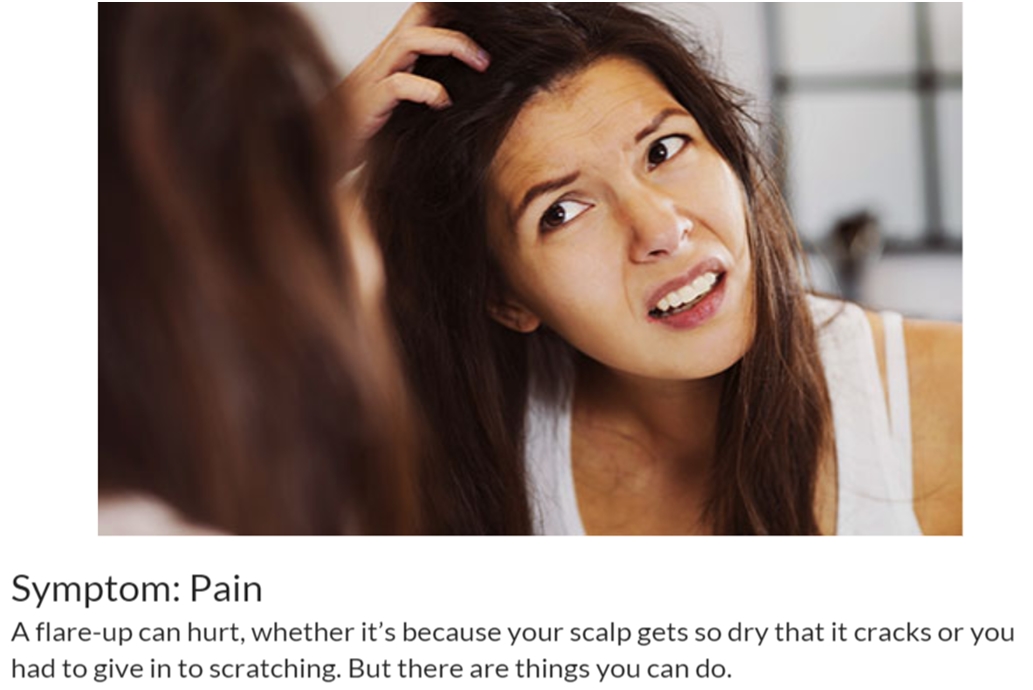
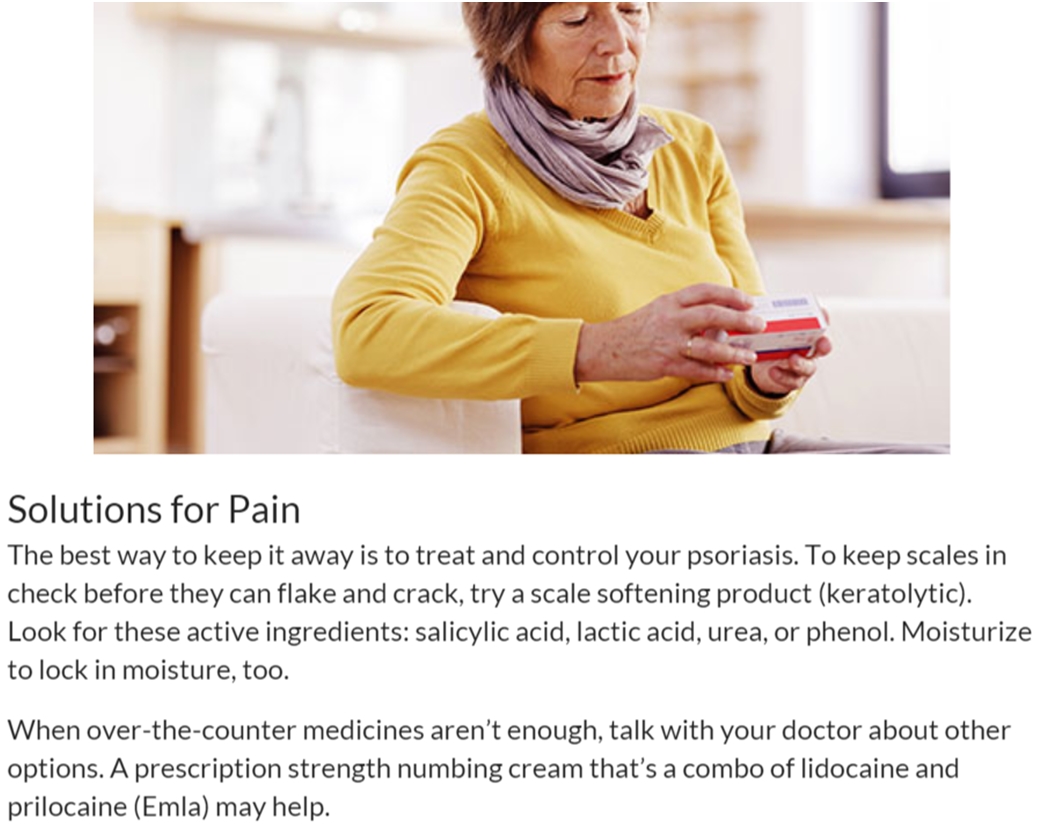
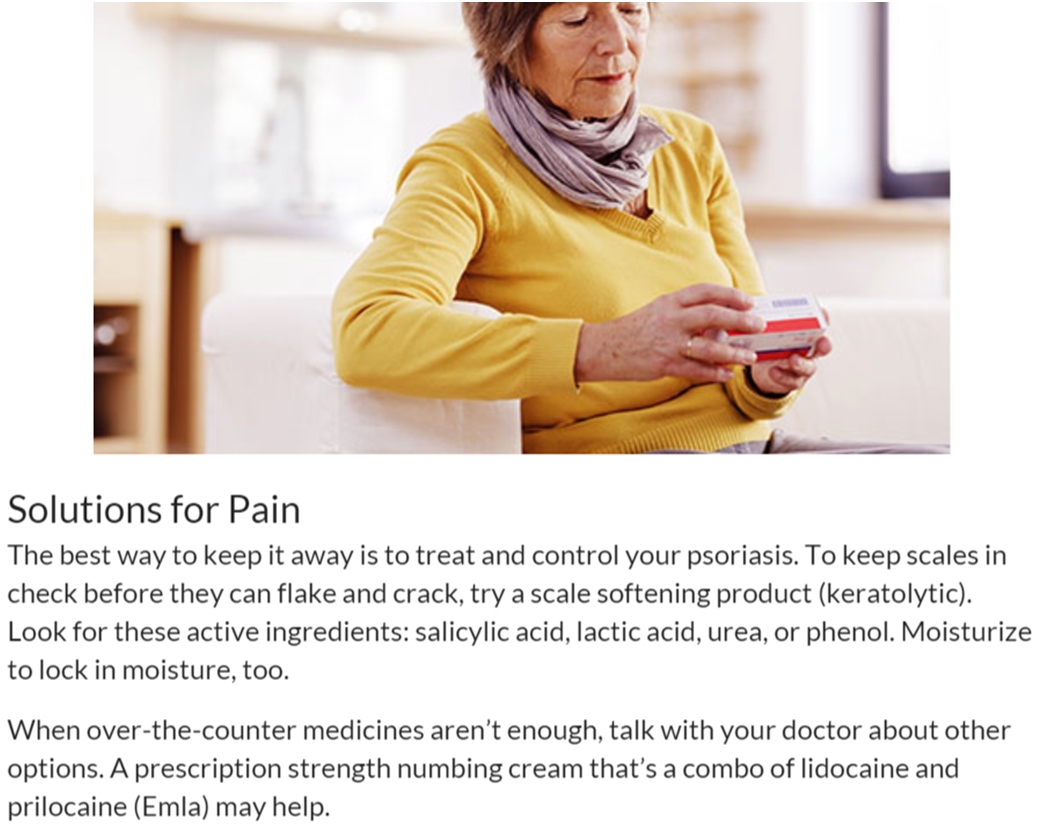
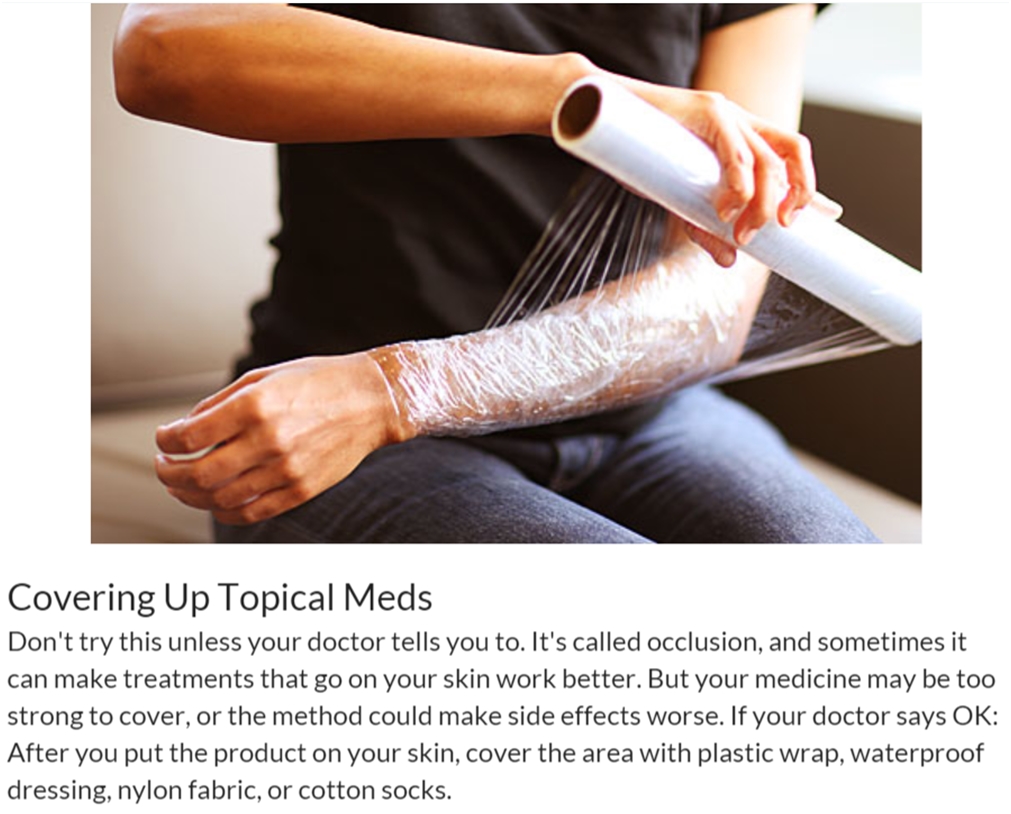
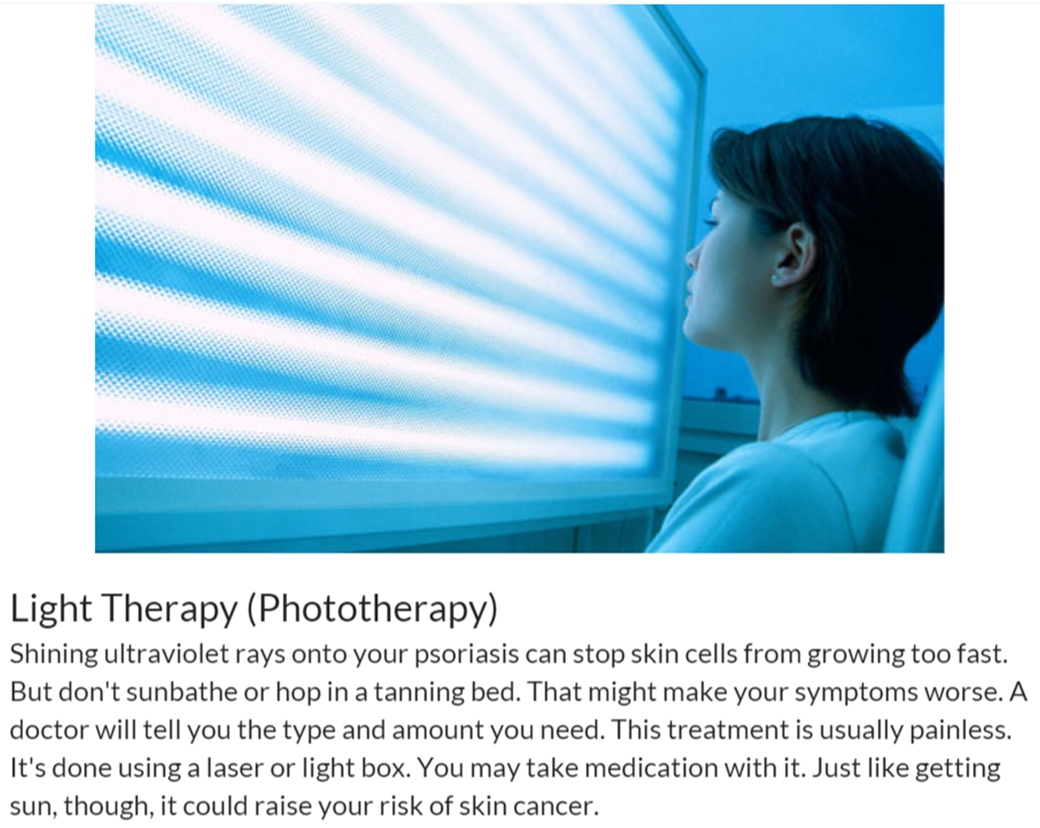
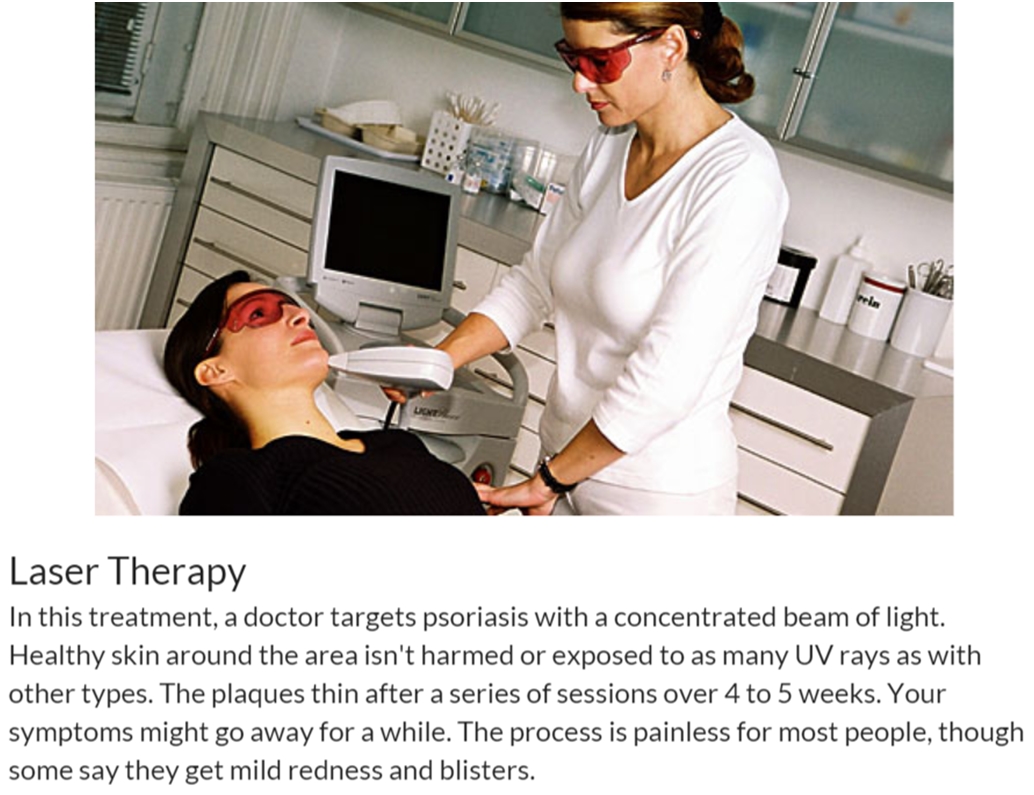
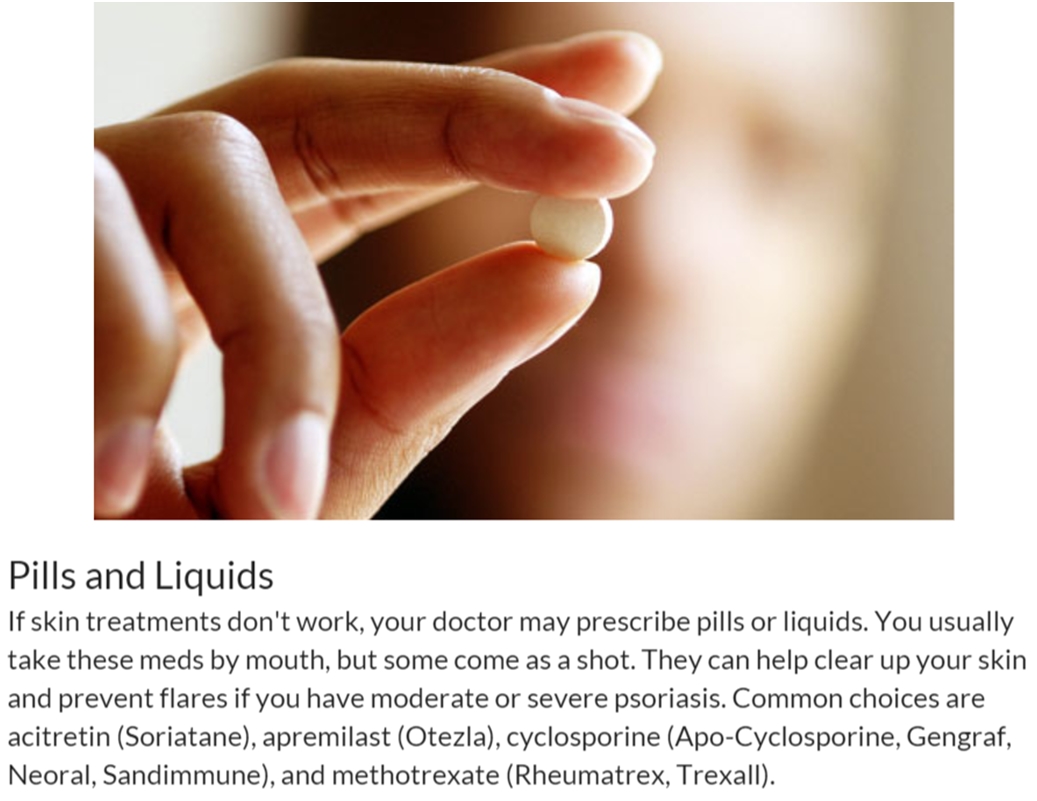
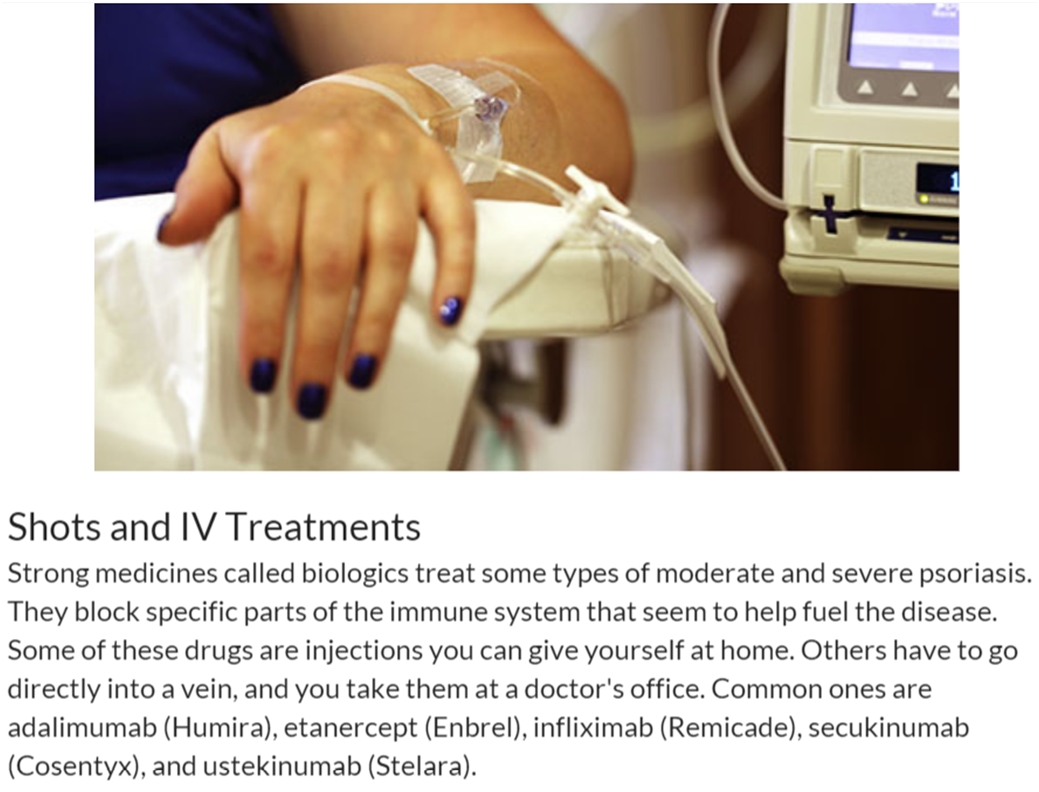
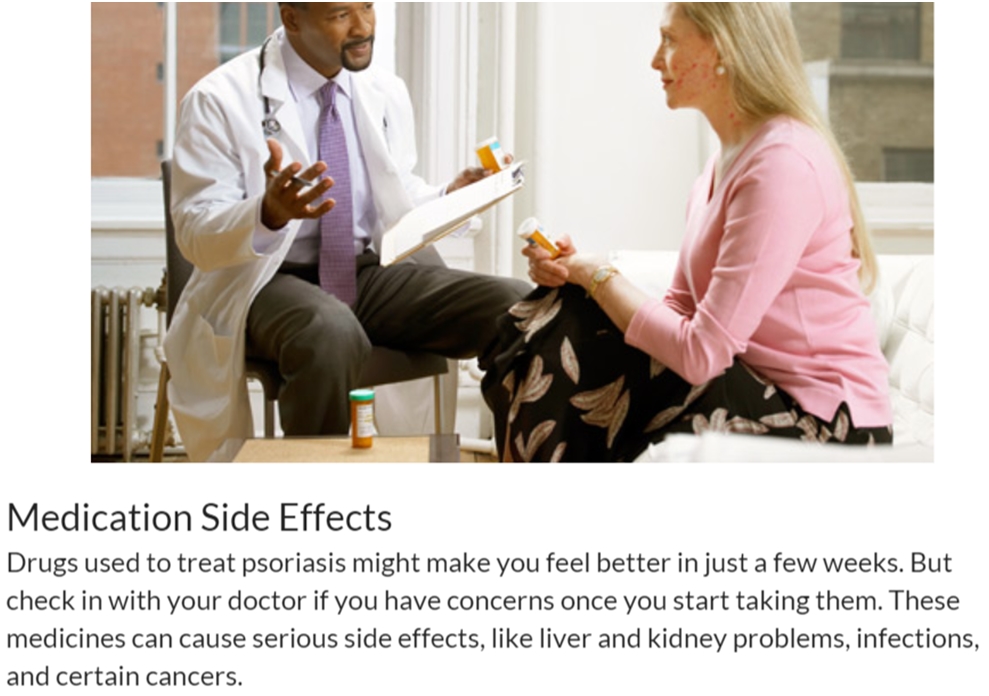
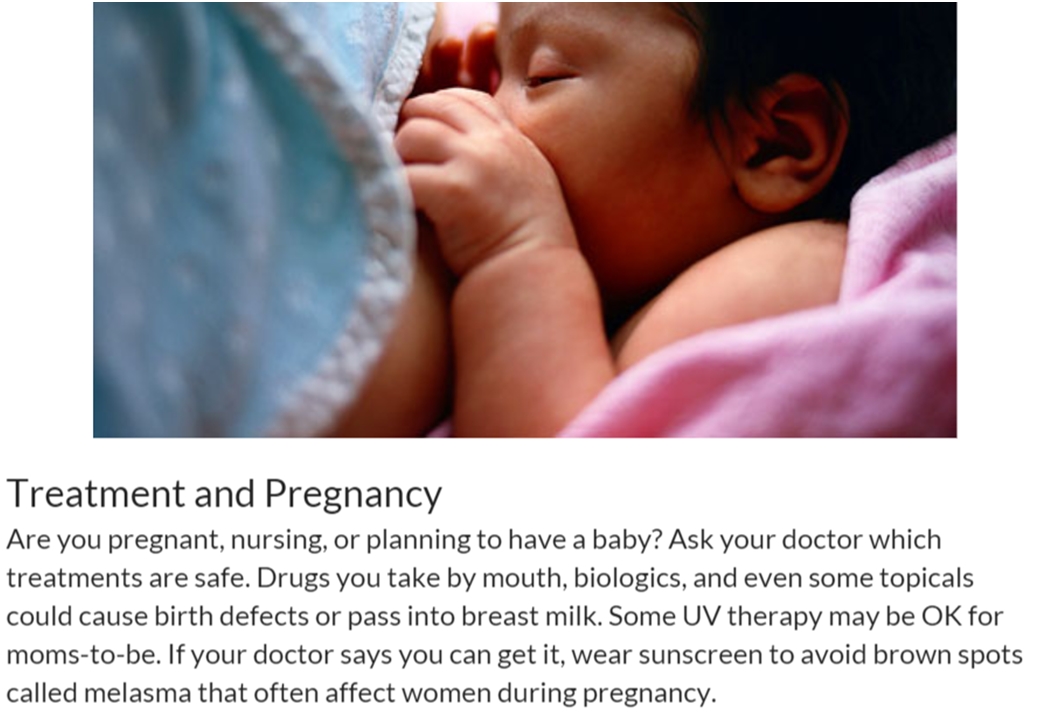
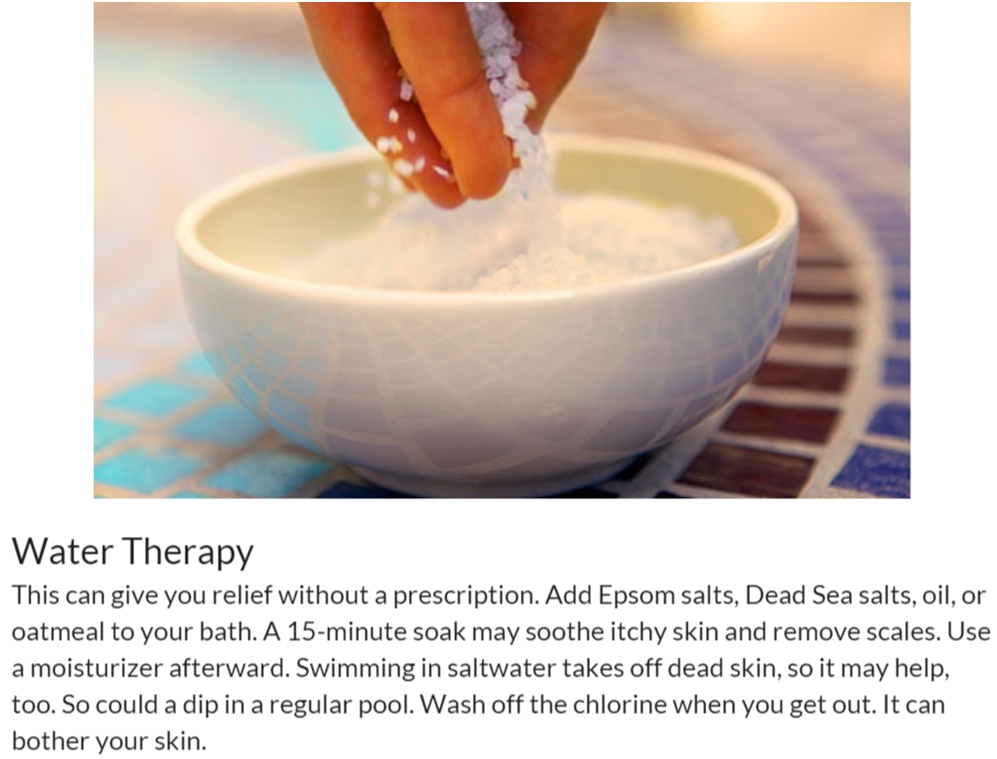
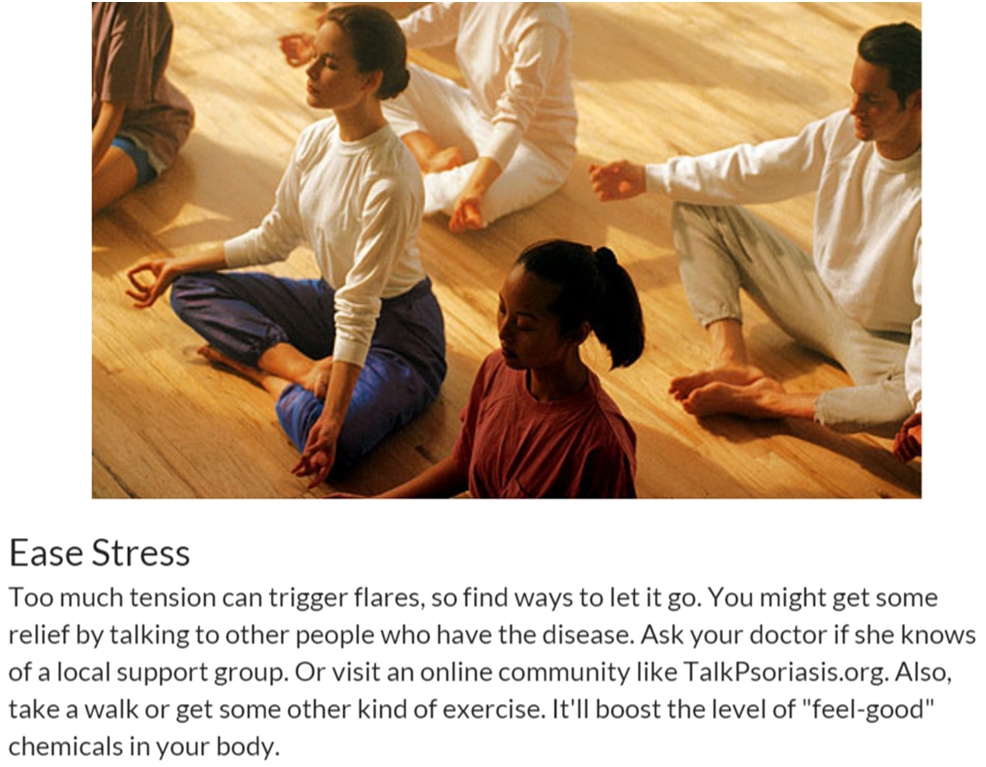
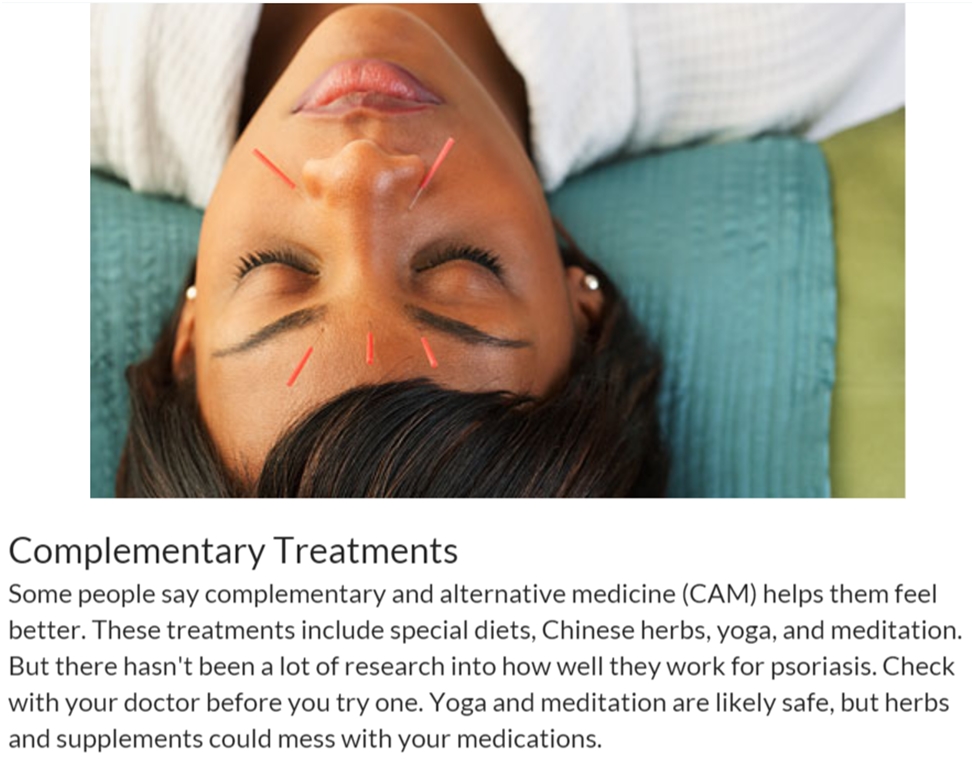
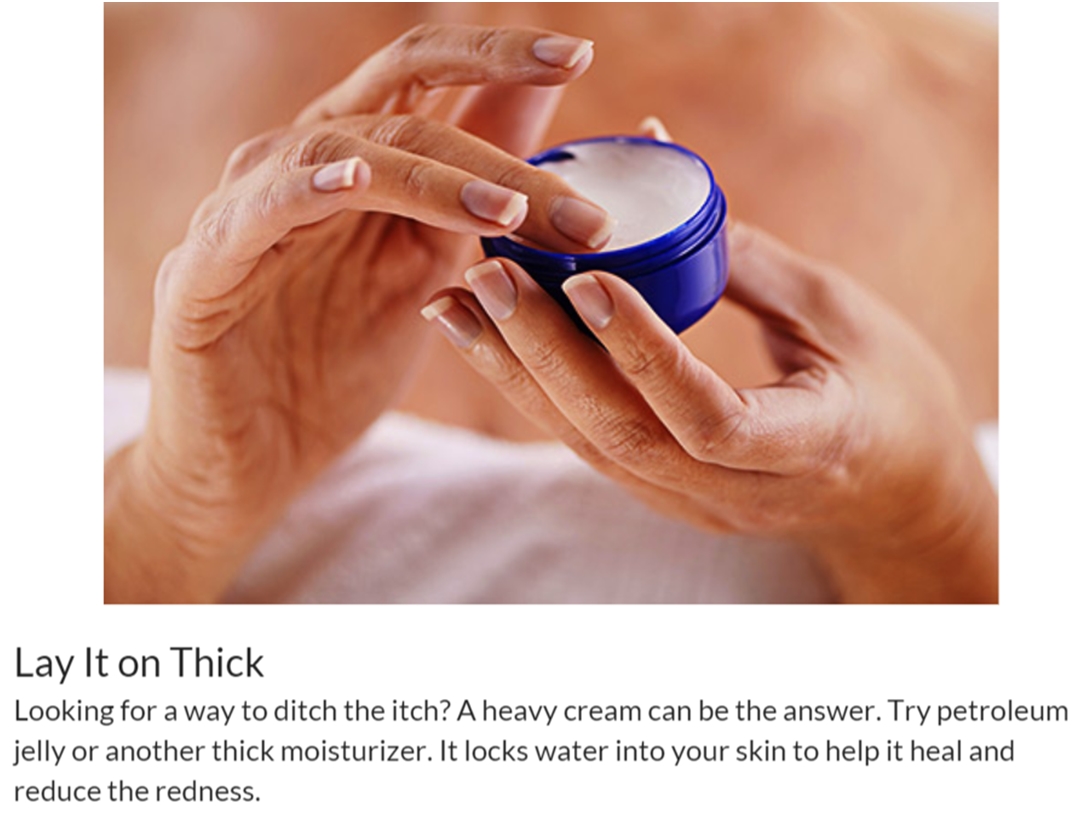
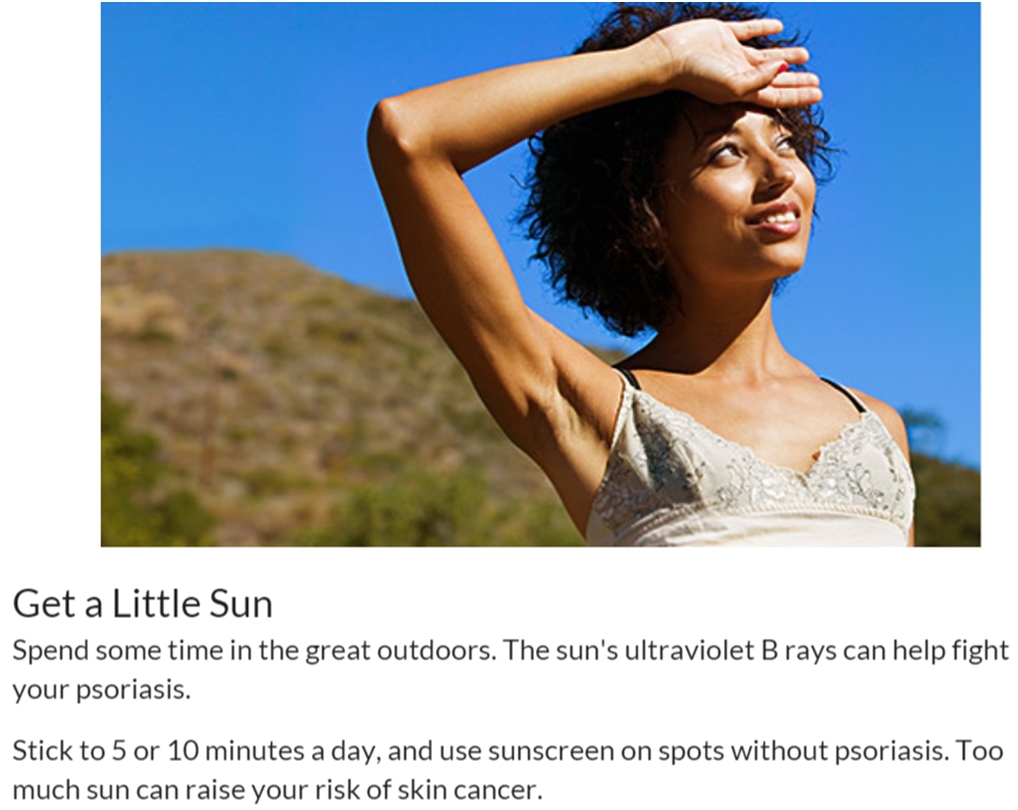
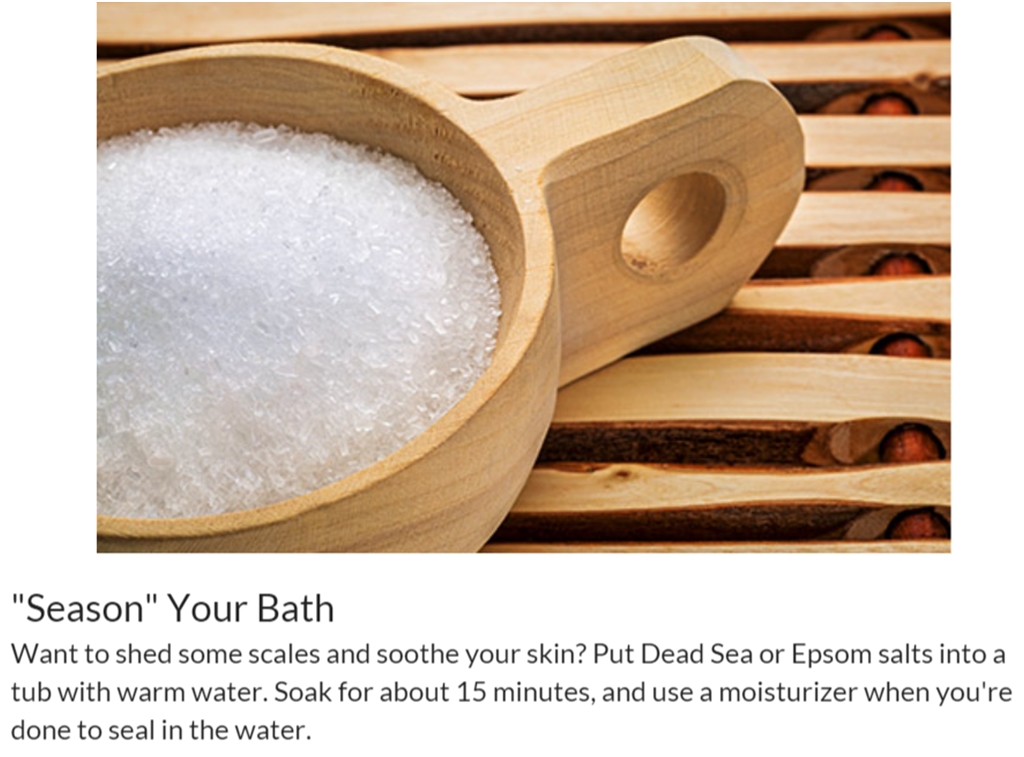
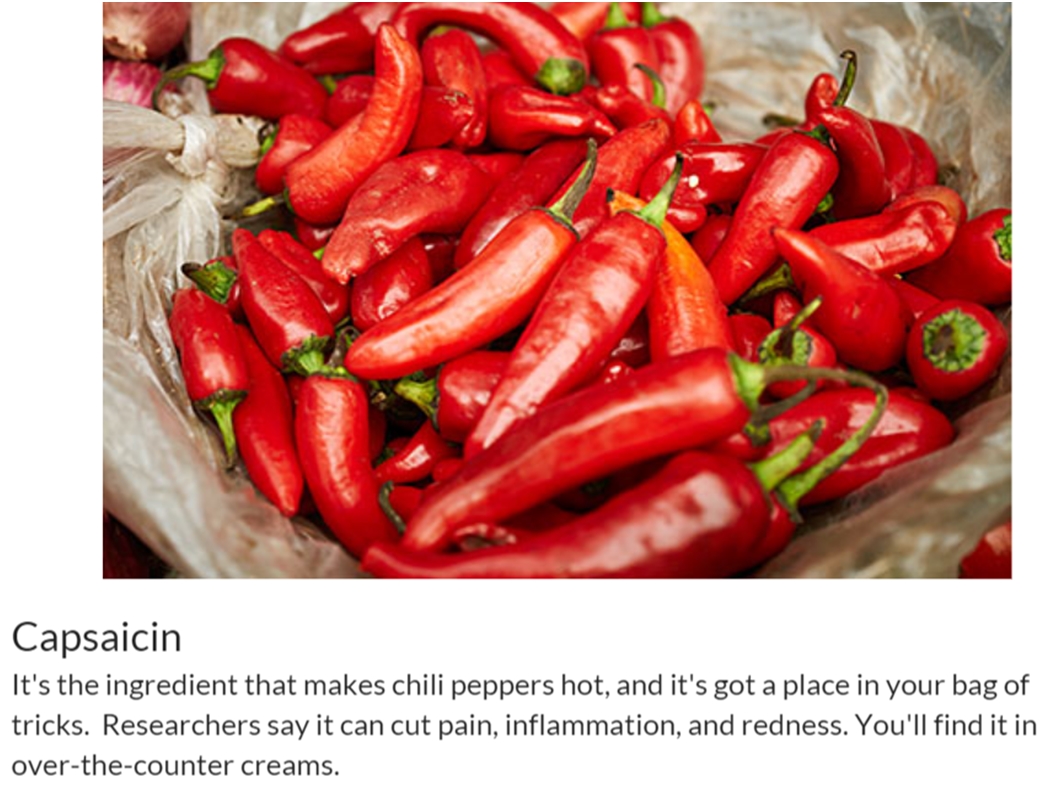
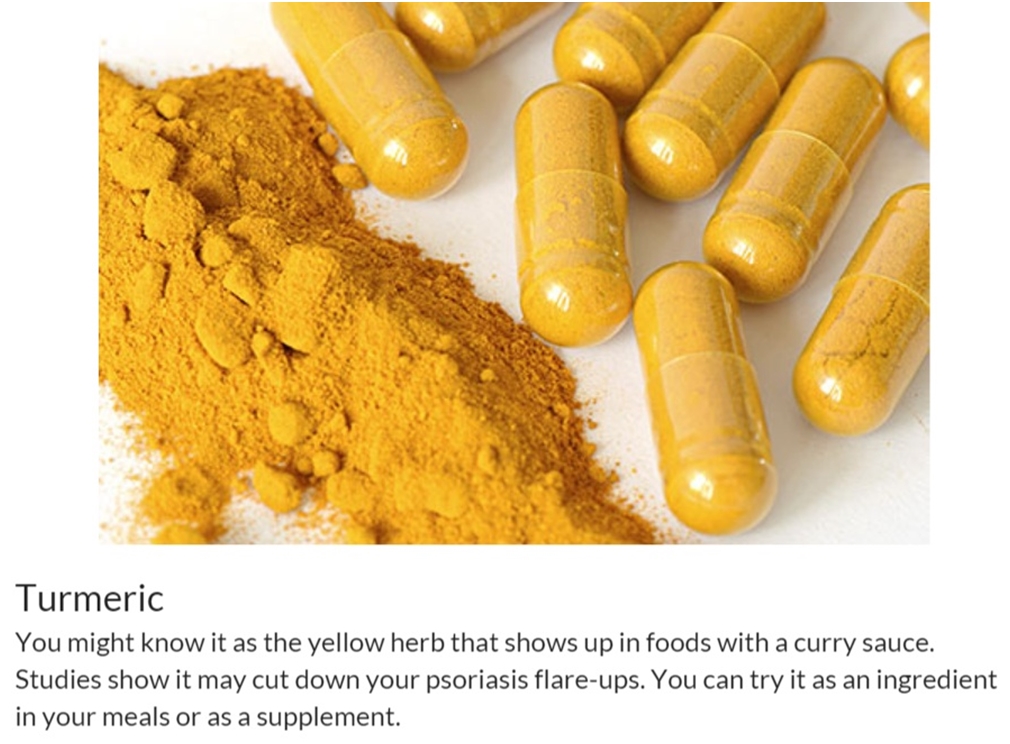
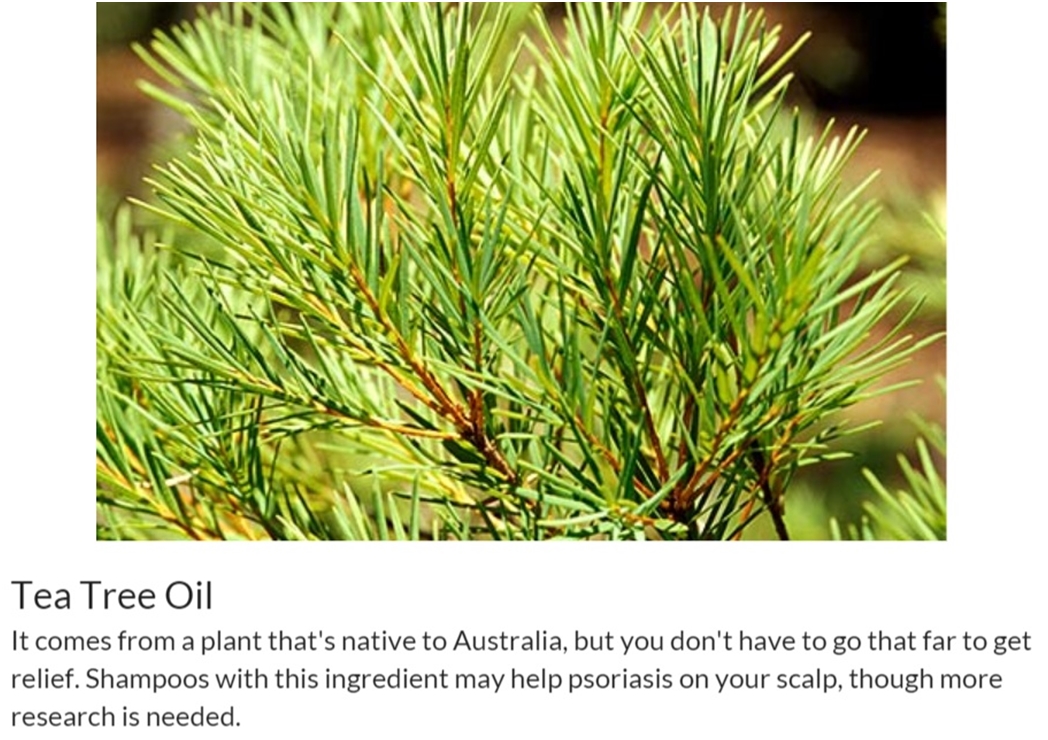

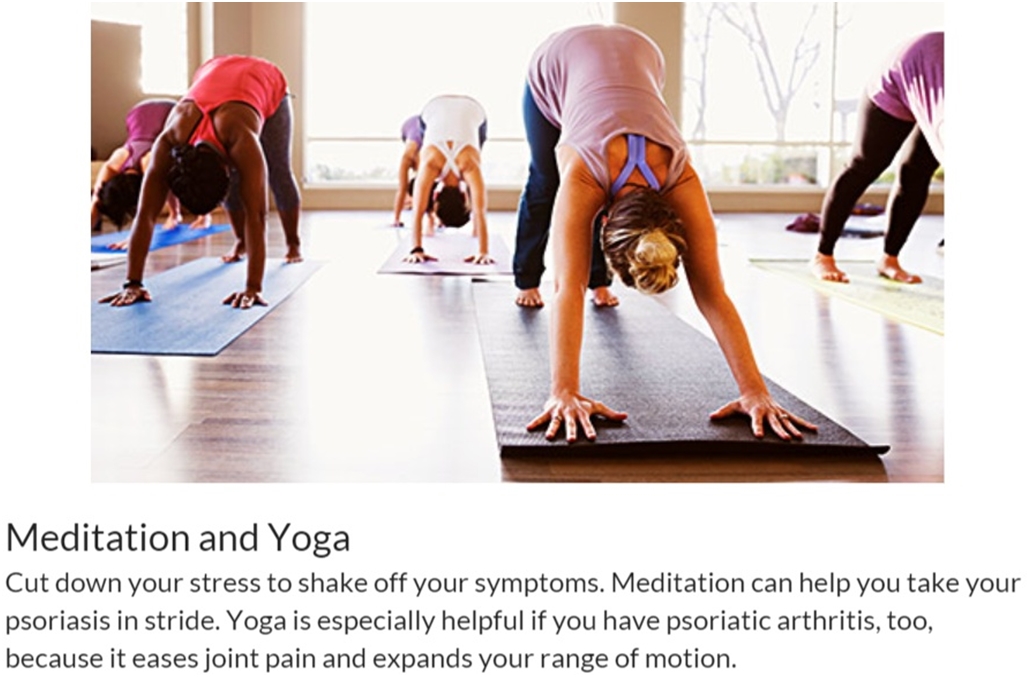
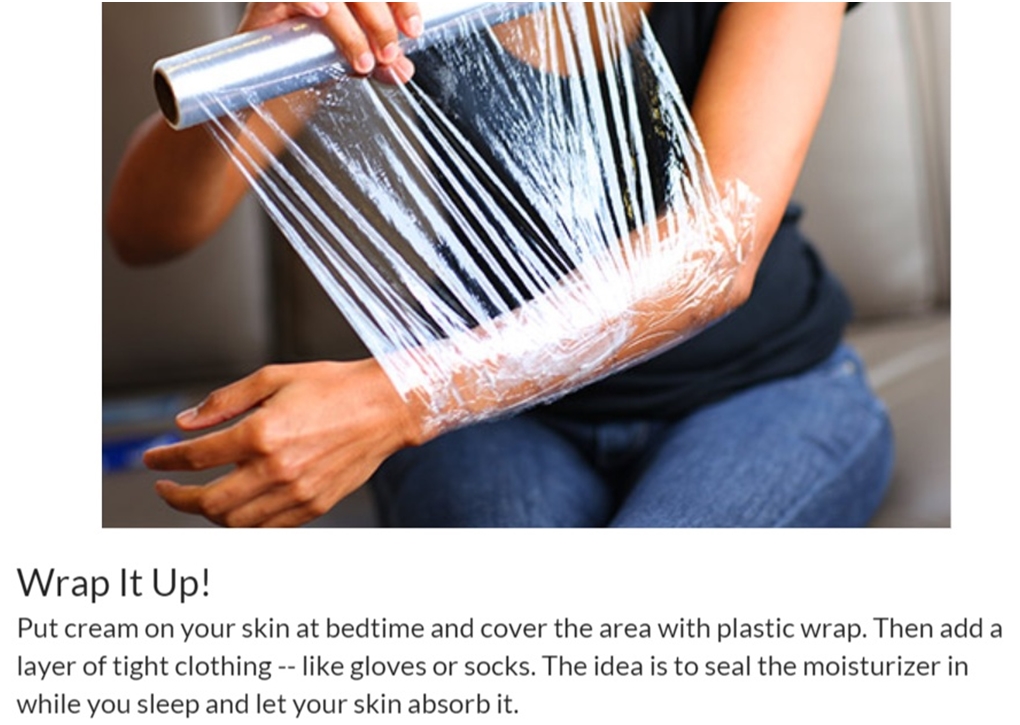
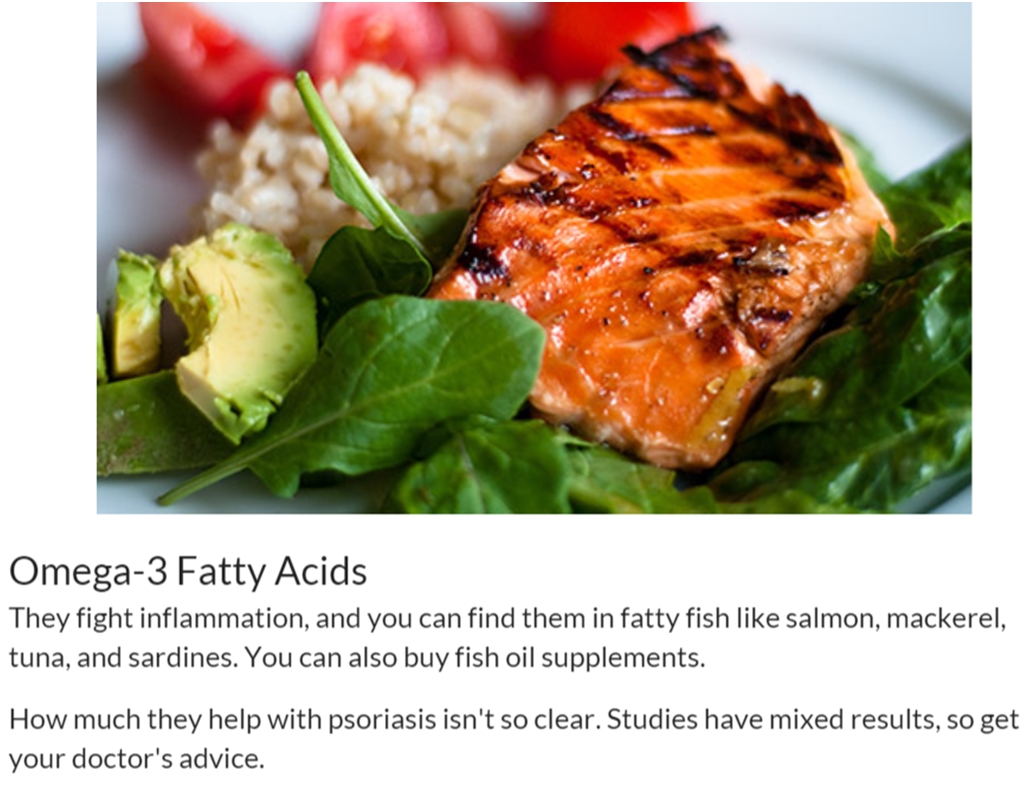


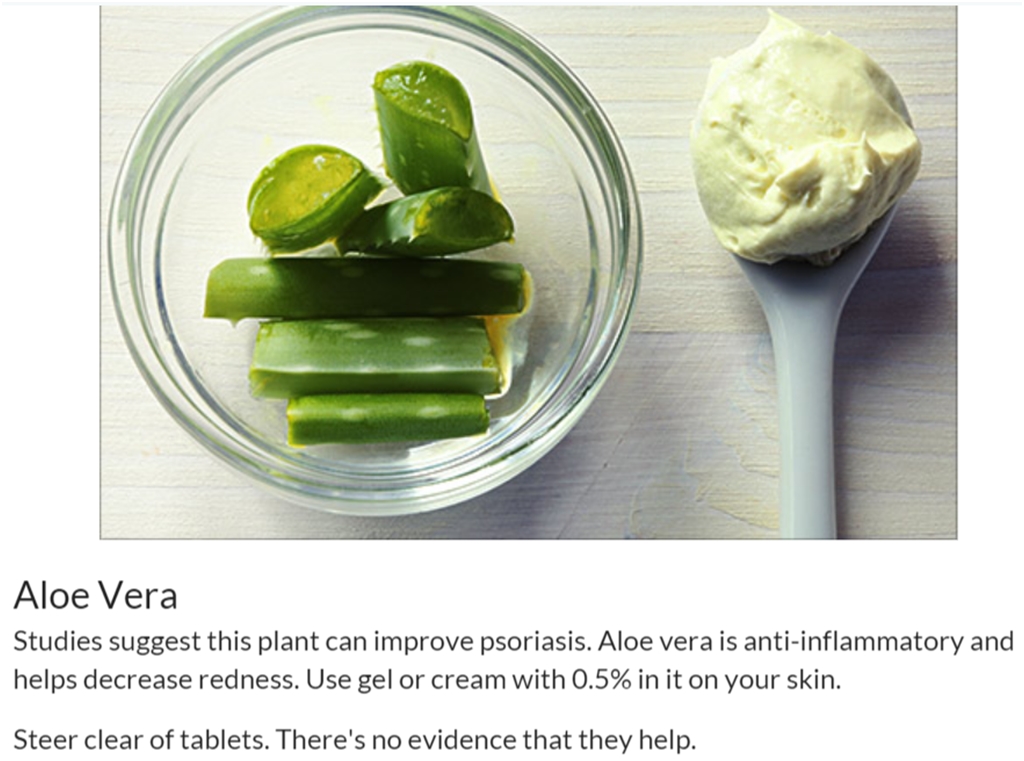

Excimer lasers, which deliver ultraviolet light to localized areas of the skin. This treatment uses intense, focused doses of laser light to help control areas of mild to moderate psoriasis without harming healthy skin around them. Targeted laser therapy is similar in effectiveness to traditional light therapy, but it works in fewer sessions with stronger doses of light that can reach deeper into the affected skin. The handheld laser wands are also good for reachingpsoriasis in hard-to-treat areas, such as the elbows, knees, palms of the hands, soles of the feet, and scalp.
Excimer laser treatments are performed in the dermatologist's office. Each session takes only a few minutes. During the treatment, the doctor aims the laser directly at patches of psoriasis. You might feel some warmth at the site or a snapping sensation against the skin.
Laser treatments for psoriasis use one of two types of lasers: a pulsed dye laser (PDL) or an excimer laser.
Pulsed dye lasers create a concentrated beam of yellow light. When the light hits the skin, it converts to heat. The heat destroys the extra bloodvessels in the skin that contribute to psoriasis, without harming nearby skin.
Excimer lasers aim a high intensity ultraviolet B (UVB) light dose of a very specific wavelength -- 308 nanometers -- directly at the psoriasis plaques. Because the laser light never touches the surrounding skin, it reduces the risk of UV radiation exposure. Excimer lasers are used to treat mild-to-moderate psoriasis.
With excimer laser therapy, patients usually have two treatments lasting 15-30 minutes each week for three or more weeks, with at least a 48-hour break between treatments. With pulsed dye laser therapy, sessions go for 15-30 minutes every three weeks.
Your doctor will determine your dose of laser light based on the thickness of your psoriasis plaques and your skin color (a lower dose is used on lighter skin). During the procedure, you will be given dark goggles to protect your eyes.
Psoriasis laser treatments work well on people with mild-to-moderate psoriasis. But because the light is concentrated, it's not effective for people with psoriasis on large areas of the body.
Because laser treatment for psoriasis is still a relatively new therapy, research is still underway to confirm its effectiveness. Some studies find that most people who are treated with lasers see real improvements in their skin that can last anywhere from several months to a year. Results are usually seen within 8 to 10 sessions.
complete health history and exam done before starting treatment.
Avoid laser treatments if you have:
Laser therapy is generally safe, but some people have reported side effects after treatment, including:
Scholars believe psoriasis to have been included among the various skin conditions called tzaraath (translated as leprosy) in the Hebrew Bible, a condition imposed as a punishment for slander. The patient was deemed "impure" (see tumah and taharah) during their afflicted phase and is ultimately treated by the kohen.[97] However, it is more likely that this confusion arose from the use of the same Greek term for both conditions. The Greeks used the term lepra (λεπρα) for scaly skin conditions. They used the term psora to describe itchy skin conditions.[97] It became known as Willan'slepra in the late 18th century when English dermatologists Robert Willan and Thomas Bateman differentiated it from other skin diseases. Leprosy, they said, is distinguished by the regular, circular form of patches, while psoriasis is always irregular. Willan identified two categories: leprosagraecorum and psoraleprosa.[98]
Psoriasis is thought to have first been described in Ancient Rome by Cornelius Celsus. The disease was first classified by English physician Thomas Willan. The British dermatologist Thomas Bateman described a possible link between psoriasis and arthritic symptoms in 1813.[99]
The history of psoriasis is littered with treatments of dubious effectiveness and high toxicity. In the 18th and 19th centuries, Fowler's solution, which contains apoisonous and carcinogenic arsenic compound, was used by dermatologists as a treatment for psoriasis.[97] Mercury was also used for psoriasis treatment during this time period.[97] Sulfur, iodine, phenol were also commonly used treatments for psoriasis during this era when it was incorrectly believed that psoriasis was an infectious disease.[97] Coal tars were widely used with ultraviolet light irradiation as a topical treatment approach in the early 1900s.[97][100] During the same time period, psoriatic arthritis cases were treated with intravenously administered gold preparations in the same manner as rheumatoid arthritis.[100] All of these treatments have been replaced with modern topical and systemic therapies.

Britney Spears 'suffering with psoriasis' as star reveals scaly skin on her leg
I have psoriasis on my legs and have seen a dermatologist who prescribed two expensive creams. They help a little but it never goes away. I've been tanning for a short time in a tanning bed every other day and have seen a drastic improvement but am a little worried about skin cancer from UVA rays. Any home remedies out there? Any advice?
Exposing the affect areas to sunlight can help ease up the psoriasis flare up, but natural sunlight is better for you skin since tanning beds can be too harsh. Try natural remedies as well, like pasteurized creams, bee's wax, and lemon oil. They are really effective and cost less as well. Hope everything goes well for you!
I have a friend with this disease and i've heard this problem is not only a genetic thing, but it is caused by an emotional issue too...
I would like to help him, do you know if there is some emotional issue connected to psoriasis?
I can tell you from personal experience, that mine gets worse when I am under a lot of stress. I teach school, and it is particularly itchy when it is the end of the grading period. It gets significantly better in summer. Less stress, plus exposure to the sun (UV light).
Treating psoriasis has benefits. Treatment can reduce signs and symptoms of psoriasis, which usually makes a person feel better. With treatment, some people see their skin completely clear. Treatment can even improve a person's quality of life.
Thanks to ongoing research, there are many treatments for psoriasis. It is important to work with a dermatologist to find treatment that works for you and fits your lifestyle. Every treatment has benefits, drawbacks, and possible side effects.
Psoriasis is a chronic disease of the immune system. It cannot be cured. This means that most people have psoriasis for life. At Dermatology Associates you'll team up with a physician who treats psoriasis, who will find a treatment plan that works for you.
We encourage our patients who have psoriasis to take an active role in managing this disease. By taking an active role, you can reduce the effects that psoriasis has on your quality of life.
I was diagnosed with psoriasis about 5 years ago. I have tried every treatment from creams to phototherapy to biologic treatments. I have recently been prescribed Methotrexate and was wondering how well this would work for my psoriasis. With the summer coming up I would like to get back into shorts and tank tops.
I have had psoriasis for 25 years (the past five severe). I also have psoriatic/rheumatoid arthritis bad. My rheumotologist prescribed methotrexate in combination with Enbrel. i have been taking it for about two years. It worked such wonders for my arthritis, so well I thought to myself, so this is how easy people with normal backs have it. Before then, I suffered such pain every day. I didn't, however, notice much of change in the psoriasis.
Have you tried tanning beds. You must have. Or at least your doctor must have told you about it. I have had a number of dermatologists since I have been diagnosed and they have all told me the same. The sun (tanning bed) is one of the best treatments for psoriasis (must kill dermatologists to recommend tanning).
By far, my greatest success has been tanning, natural sun or artificial.
If legs are your troubled area, do not be afraid to shave. I was for a long time when my legs first became covered. Finally, I said, the heck with the fear of cutting myself, I was ashamed to be walking around with hairy legs. Shaving also worked wonders and didn't hurt at all. As long as you use a good/more expensive disposable razor.
Keep up with the methotrexate. I have done some research of my own on it and I guess it works for many people, but you should ask your doctor about using Enbrel or Humira in combination with it. If your doctor prescribes Enbrel or Humira too, ask for the autoinjectors -- it is quick and painless.
My daughter has sever psoriasis only on her scalp. We have tried every over the counter shampoo we can buy. We have also tried a cornmeal and vinegar scrub. Any help?
Couple of things to try, I use Betnovate lotion rubbed into my scalp before I go to bed, keeps it quite under control. The best thing I found when I was younger was baby oil, sounds weird I know but rubbing baby oil into my scalp before I went to bed did work wonders, obviously you'll need to wash hair thoroughly in the morning(maybe even twice). I would also recommend a shampoo called Alphosyl(think you can still buy it in boots), other shampoos to try include T Gel and Johnsons No More Tears(yellow bottle). One of these should help(I have learnt from experience!)
I have scalp psoriasis. My case was not that bad though, I've been taking some special shampoos and hair oil for over a week. And it's working really well, it's almost gone. But I've lost some hair before the treatment and I've heard from SO many people that the hair would grow back when your scalp is back to normal. So how long would it take for the hair to grow back ?
Hair generally grows about 3/4 -1" per week to 10 days but it depends on the person.
I have had psoriasis since I was 9. I'm 27 now. No medicines help. No creams or topical prescriptions help. It never goes away, but my dermotologist suggested going to the tanning bed. Just wondered if anyone knew "why" this helps or "how" it helps psoriasis.
Sunlight is a major source of Vitamin D production in our bodies. Skin problems are often caused by diminished production of Vitamin D in the body. Therefore, catching rays (in moderation) promotes Vitamin D production and may lessen skin symptoms. I have lifelong eczema; nothing else worked for me, either. I finally moved to a warm climate...it's not completely cured, but the regular sunshine has greatly improved the condition and my life overall.
I have about 10 Psoriasis blotches on my legs and I've been following a certain diet, and trying to improve my lifestyle so that I could heal my Psoriasis and prevent it from emerging again.
Vitamin E will not heal your psoriasis. Pure Vitamin E oil is pretty greasy and doesn't really absorb very well. Try Dermarest Psoriasis Medicated Moisturizer; it's available from drugstore.com
I have recently been diagnosed with Psoriasis and found it spreading at an alarming rate. I am moisturising, putting the cream the doctor gave and yet it spreads.
I am finding all of this really hard to understand so wondered if you could help.
Thank you for all your answers.
I saw it in a commercial recently, and I want to look it up because I'm doing a report on psoriasis.
Could it be Raptiva? It's an injection you give yourself once a week, I believe
I was diagnosed with psoriasis about 5 years ago. I have tried every treatment from creams to phototherapy to biologic treatments. I have recently been prescribed Methotrexate and was wondering how well this would work for my psoriasis. With the summer coming up I would like to get back into shorts and tank tops.
I have had psoriasis for 25 years (the past five severe). I also have psoriatic/rheumatoid arthritis bad. My rheumotologist prescribed methotrexate in combination with Enbrel. i have been taking it for about two years. It worked such wonders for my arthritis, so well I thought to myself, so this is how easy people with normal backs have it. Before then, I suffered such pain every day. I didn't, however, notice much of change in the psoriasis.
Have you tried tanning beds. You must have. Or at least your doctor must have told you about it. I have had a number of dermatologists since I have been diagnosed and they have all told me the same. The sun (tanning bed) is one of the best treatments for psoriasis (must kill dermatologists to recommend tanning).
By far, my greatest success has been tanning, natural sun or artificial.
If legs are your troubled area, do not be afraid to shave. I was for a long time when my legs first became covered. Finally, I said, the heck with the fear of cutting myself, I was ashamed to be walking around with hairy legs. Shaving also worked wonders and didn't hurt at all. As long as you use a good/more expensive disposable razor.
Keep up with the methotrexate. I have done some research of my own on it and I guess it works for many people, but you should ask your doctor about using Enbrel or Humira in combination with it. If your doctor prescribes Enbrel or Humira too, ask for the autoinjectors -- it is quick and painless.
I've had psoriasis for like 6 years on my knees and elbows. Nothing I've used has worked. Even the steroid creme my doctor suggested. I heard about this book where you change ur diet and it cures it. If you've read it, please give me feedback.
The main cause of psoriasis is overreaction of the immune system. Identifying certain foods, chemicals, etc can be very helpful in battling this disease. I try to avoid soy and sea food which trigger my flare-ups.
After using number of prescription drugs I've turned to the natural treatments.
Now I use herbal remedies from serenaskin.com
I have psoriasis behind my ears, scalp, elbows, on one knee & one on gluteal cleft but its small... i wanna get rid of them pls help how can I get rid of dem fast? whats da best thing to do or whats da best cream for it?
ooh, the hard to reach places huh? hmmm, i would try herbal medications and remedies before chemically designed over the counter meds/prescriptions. the skin is especially sensitive behind the ears and u dont wanna scar. try:
The hot Epsom salts bath has been proven valuable in the treatment of psoriasis. Application of olive oil after the Epsom salt bath is also effective and also one of the effective home remedies for psoriasis.
Regular seawater baths and application of seawater over the affected parts once a day is highly beneficial. This is one of the best psoriasis remedy.
Bitter gourd is a valuable home remedy for psoriasis. Take a cup of fresh juice of this vegetable, mixed with a teaspoon of limejuice on an empty stomach daily for four to six months. This is a good diet for psoriasis.
The use of mudpacks is also beneficial for the psoriasis. They absorb and remove the toxins from the affected areas.
Cabbage leaves can be used in the form of compresses. They can be applied on the affected area after removing the thick veins and washing them thoroughly. This is also one of the effective home remedies for psoriasis.
Sunlight is the best and natural remedy for psoriasis.
Vitamin E therapy has been found effective in the psoriasis treatment. A daily dose of 200-800 I.U is recommended as they reduce itching of the area.
Lecithin is also considered as a remarkable remedy for the psoriasis treatment.
Psoriasis cure - 6-9 lecithin capsules in a day are recommended.
Application of Aloe Vera gel and garlic oil on the affected area is also beneficial and is good natural remedy for psoriasis
Application of cashew nut oil on the affected areas at night after a thorough wash of the face is highly beneficial and is one of the effective home remedies for psoriasis.
I have psoriasis on two nails and now it is coming on two more fingernails. I wonder is there anything out there that helps it, I have an appointment with a dermatologist in two weeks.
Hello there. I have plaque psoriasis on arms, knees and scalp and the only remedy that works for it without fail is Champori Cream and Spray combo. You may want to try it for your nails as well: it is natural and the effect is long-lasting. They offer money back guarantee, so if it doesn't work - it's free.
Best,
Bernadette
I have it on my fingers and the skin breaks up and bleeds. It has been diagnosed by a consultant as a hybrid type of psoriasis. Need help!
Psoriasis is treatable with topical steriods, but they only suppress the symptoms, they don't treat the cause. Stress is a major cause of psoriasis outbreaks and anything you can do to reduce stress in your life can help reduce the symptoms.
I use an essential oil mix to treat my psoriasis: lavender, bergamot and neroli in jojoba oil. It isn't a cure, but helps keep it under control without using steroids. All three oils are useful in reducing stress and treating skin conditions.
Diet can also affect psoriasis. Alcohol, caffeine, sugar and other stimulants can make it worse. Reducing the use of stimulants, doing a colon detox and eating organic foods can help
I have psoriasis and been diadnosed with psoriatic arthritis and it really killling my back and neck the doctors here only prescribe drugs which i dont want, is there any other way to get by with no pain?
I have Psoriatic Arthritis. Initially you need to make a health log. A diary and every night before you go to bed, write down what you did, what you ate and on a scale of 1-10, how you feel. Then after six months go back and read what you wrote and see if you can link up any 'foods' to how you felt. I found out that if I have a fresh orange juice every morning for breakfast, the third morning my joints were Hades. I cannot go anywhere near citric fruit, so have to get my vitamin intake elsewhere. Moreover 'refind' foods are not good can stomach them, but pay a price, silly things like white sugar. As citric acid is a preservative and sugar is located in many of our foods that we buy, I have to be careful. Next what to take, especially like you pain killers do wonders for the pain and my brain does not function! I tried a few diferent brands of anti-inflammatory drugs, until I found one that really suits me, been on the same one now for 20 years. I then read about Eskimos never succumbing to Arthritis, because their diet is 'fish' so what they term anti-inflammatory food. However I could not eat fish everyday, so opted for Omega 3 oils. I saw a Rheumatologist, who started me on Evening Primrose Oil and life really improved. Got a dog, went walking three miles three times a week, then joined a Pilates Class, really got my muscle tone up. Exercise produces endorphines, which are natural pain killers and it works. However been warned, exercise can be addictive, especially as you are self medicating, making your own pain killers.
I am still here some 30 years after being diagnosed with Psoriasis and 20 years after the Arthritis, so I guess I must be doing something right! However their is no 'quick fix' and the answer is really in your own hands.
I am not pregnant yet, but planning to become this year. I have psoriasis for 16 years, it is an active form, I have to use my medicine every other day. Unless I will get those red spots all over my body and face. I use Clobetasol (liquid), external, applying to every spot.
Will the benefits outweigh the risk to my unborn child? This is a question you should ask yourself and your doctor. There is no way of knowing how much of the corticosteroid is being absorbed into your blood stream. Corticosteroids can cause birth defects.
I would think that having spots for a year would be a small price to pay for a healthy baby
My mom is an elderly lady and has a bad case of psoriasis and its getting worse. I have never seen it this bad.
Denorex knocks the daylights out of psoraisis, but it is a little harsh, and not always a good choice for daily use, but its a good one to use just to get things under control. After an initial blast from Denorex, Selsun Blue with conditioner might be a good choice for daily use.
These are separate skin conditions, and while I have been diagnosed with Eczema since infancy, I believe I may have a mild form of Psoriasis.
Both rarely are rarely "active" at the same time, but sometimes they are, there is a noticeable difference between the patches of skin, even though they are usually close to each other, even overlapping at times. Have I just done too much research on skin conditions, or is it possible to have both Eczema and Psoriasis?
Hi, you can try one of the natural treatments available on the Internet (just google "natural treatment of psoriasis") and take your pick. Some of them do actually work. For my psor. I use herbal cream by Champori quite successfully. It takes just a couple of weeks to clear the spots and they then stay clear for months on end.
Try it: Champori is available online without prescription and comes with money back guarantee so if it doesn't work for you - it's free.
I am a wine drinker, and have been for about 3 yrs now. For the last year and a half, I have been dealing with psoriasis (on the scalp and body) and no medical treatments have worked. I am allergic to Sulfa medications. Do you think that b/c wine has Sulfites in it, that my psoriasis could be an allergic reaction?
Hi, the connection between wine and psoriasis is not clear. You can easily find out if wine triggers your psoriasis by staying away from it for a week or two.
For psor. treatment you can try one of the natural remedies available on the Internet (just google "natural treatment of psoriasis") and take your pick. Some of them do actually work. For my psor. I use herbal cream by Champori quite successfully. It takes just a couple of weeks to clear the spots and they then stay clear for months on end.
Try it: Champori is available online without prescription and comes with money back guarantee so if it doesn't work for you - it's free
I have psoriasis on my scalp. I want to know if it is safe for me to use hair gel/spray/whatnot. Also, is it okay to color your hair if you have this skin condition? If the answer to the above is "no," then once my psoriasis has cleared up for a bit is it safe to begin using these things again, or will I be banned from hair products for life now that I have it?
Scalp psoriasis appears as dandruff, and treatments can leave your scalp more sensitive. There are a variety of products available on the market that are designed to reduce the amount of skin flakes and the scalp itching. Try consulting your doctor about it just to be on the safe side.
Every morning when I get up, but still in bed, there is this "burning " feeling in both soles of my feet. Once I start walking, the feeling disapppears. I wonder if this is related to my psoriasis ?
Sounds like poor circulation. But I'm not a doctor....you should go see a doctor as soon as possible. Poor circulation is sometimes an indication of something more serious so don't delay....hopefully it will just be minor.
My friend's child came home from school with nits, and I was at her house that day, so I have been exposed to it. Now with psoriasis on my scalp, I was wondering what I could use to make shure that I don't get them, and that won't hurt my head. Chances are that I didn't get them, but I want to be safe. I would prefer to not use chemicals if at all possible.
There are quite a few totally natural remedies available that readily kill head lice. The ones we recommend don't contain any chemicals, we believe chemical treatments are both dangerous and ineffective.
Suffocation is an effective method where oil based products (i.e.: conditioner) are used to block the breathing holes and kill the live lice. The real trick though is to find natural products that will kill both the live lice and their eggs in one fast effective treatment.
Remedies containing Neem Oil are known to be highly effective as Neem interrupts the growth and reproduction of the head louse. Neem’s insecticidal properties are widely recognized now and the oil is commonly available at your local health food store.
Feel free to check out the articles at the following site for more advice.
I have heard that tea tree oil can assist with infections and such not too sure about psoriasis. Also, have had a couple of abscesses. Any help would be much appreciated!
You are right!
Tea tree oil possess the following properties: antiseptic, anti-fungal and insecticidal.
Tea tree oil may be used for psoriasis treatment, dandruff treatment and even against the scabies mite.
There exist Tea tree oil Shampoos and Body Washes, Tea tree oil Creams and Lotions etc.
Pure Essential Tea tree oil may be added to your body lotion, liquid soap etc.
Tea tree oil should not be taken internally, even in small quantities, because orally used Tea tree oil is toxic.
Important Note: Be very careful with the Tea tree oil concentration.
You should not exceed the 0.1%-1% Tea tree oil concentration in your body lotion.
I have psoriasis kinda bad, and is there any kind of makeup for your skin or anything that is waterproof or something? If you don't know what psoriasis is then don't answer please, I hate this skin disease and its almost impossible to hide. So please help
I'm 25 and I've had psoriasis since I was 11...I definitely know how you feel!!
I honestly give you props for even putting on a bathing suit...when I've had it really bad in the summer time, you wouldn't dare catch me by a pool!
Unfortunately, there's no way to hide it. Unless you're on some kind of treatment to take away what's visible...you're just stuck with it. I'm sure you already know this though
My step father has really bad psoriasis problems on his face, and i think he's desperate to find anything right now!
There has been recent news which came out in the November 2008 Issue of Archives of Dermatology which proves a traditional Chinese medicine works in 82% of its case study. Indigo Naturalis is a dark blue plant based powder which was used in the study. I think a bottle of it is around $20. Check out the article below and the magazine article.
I have psoriasis and would like to know of various ways to deal with it as far as medication and treatment are concerned.
Thanks in adavnce.
There are many different treatments available to help control psoriasis, but no single treatment works for everyone. Usually a trial-and-error approach is taken to find the most appropriate one.
You have 3 basic types of treatments:
1.Topical treatment (applied directly to the skin) 2.Phototherapy (skin is exposed to ultraviolet light) 3.Systemic treatment (drugs or medications taken orally or by injection)
There is also a great number of alternative psoriasis treatments that include everything from acupuncture to fasting.
The goal is to find a treatment that works the best with the fewest side effects. One of the first principles of psoriasis treatment is to not create anything worse than the disease.
Hi, I have scalp psoriasis and it can be quite embarassing . Is there a natural way without steriods?
Hi, you can try one of the natural treatments available on the Internet - some of them do actually work. For my scalp psor. I use herbal cream by Champori quite successfully. It takes just a couple of weeks to clear the spots and they then stay clear for months on end.
Try it: Champori is available online without prescription and comes with money back guarantee so if it doesn't work for you - it's free.
I have Psoriasis on about 30% of my body. I have been using Skin Zinc products and it helps some but is expensive and is getting hard to find.
Has anyone had success with any other over the counter products?
Fish oil, Vitamin D.
Well, my psoriasis is manifesting it's scaley presence over my limbs again. (It's summer! How weird!- normally it's better then)
I know you can't get rid of having the psoriasis itself) I'm getting married early next year, and would rather not have to walk down the aisle with big red welts on my arms and face.
I have red spots on my face and they get really dry flaky skin on them. I am 99% sure that it is psoriasis. What can I do about the symptoms?
Oatmeal is really a great way to easy the itching and the pain. they make lots of soothing bath stuff, my son had a bad case of chiggers and Aveno Oatmeal bath was great. The itch stop and the scars from the bites went away quickly
I have had mild psoriasis on my hands, elbows and knees for years. Now, for the first time recently, I have it on my face. I use eleuphrat ointment which (I think) is a steroid base on my body. Can I use this on my face too?
NO! Don't self medicate it on your face!
The skin on your face is thinner than on your elbows and knees and steroid cream permanently thins the skin with prolonged use - that's why it's prescribed so sparingly.
I thought I had it on my face as well (also having it on knees and elbows), however the doctors now think it is seborrheic dermatitis, which is basically a yeast bacteria and usually starts on your head as dandruff, then drops into your eyebrows, then onto your cheeks and sometimes onto your chest.
There are various stages of it but it's typified by red patches and flaking skin.
It would certainly be worth looking into that as well.
The best thing you can do is go and see your doctor, one who specialises in skin conditions if possible.
My husband has a mild case of psoriasis. On his elbows, knees, back and lower back. He doesn't treat it because he says it is sometime that won't go away, he uses certain products for relief sometimes. What are the chances our baby will get that? And can he get it on his face? Thanks I am pregnant
they don't even know for sure if it's genetic, so no one will be able to answer your question
The cause of psoriasis is not known, but it is believed to have a genetic component. Several factors are thought to aggravate psoriasis. These include stress, excessive alcohol consumption, and smoking.[1] Individuals with psoriasis may suffer from depression and loss of self-esteem. As such, quality of life is an important factor in evaluating the severity of the disease. There are many treatments available but because of its chronic recurrent nature psoriasis is a challenge to treat.
I am an afro american female and I have been battling with psoriasis in my scalp for several years. My hair use to be thick but now it has gotten thin.... Is there something I can do to stop this irritation?
My sister has psoriasis on her scalp that is pretty bad. Youi cant see it unless she parts her hair in the back like for pigtails, but shes really self conscious about it. The shampoo prescribed for her is very very expensive and although it works she cant afford to pay 100 bucks a month for shampoo. Any home remedies or ideas out there for help with this> Than ks!
Hi, she can try one of the natural treatments available on the Internet (just google "natural treatment of scalp psoriasis") Some of them do actually work. For my scalp psor. I use herbal cream by Champori quite successfully. It takes just a couple of weeks to clear the spots and they then stay clear for months on end.
Try it: Champori comes with money back guarantee so if it doesn't work - it's free.
My boyfriend has psoriasis on his scalp and elbows. it isn't that bad on his elbows but its maybe mild to moderate for his scalp- extremely flaky. what is the best product to use that you've tried and actually works?
Hello there. I suggest that your friend should look into natural remedies before subjecting herself to the steroidal and immunosuppressant drugs the official medicine today use for treating psoriasis. The side effects are worse than the disease itself. For me personally the natural remedies from Champori.com works the best; and I spent many years looking for something that is safe, effective and fast-working. Try it: it comes with money back guarantee so if it doesn't work for your friend
Yes. When you open the Something for Psoriasis™ Moisturizing Gel jar for the first time, the product may have separated some please mix the contents thoroughly prior to application. How should I store Something for Psoriasis™ Moisturizing Gel? It is highly recommended to store the product at normal room temperatures. Do not store in extreme heat. This can cause the oils in the product to possibly leak out and stain.
Persons who are pregnant or lactating should consult a health care provider before use.
If you are currently using any prescription type psoriasis medications, you should never mix products. Something for Psoriasis™ Moisturizing Gel is not a drug. It is a moisturizing gel. You should always check with your physician before using this or any other products.
As said before, everyone is different so it's impossible to give you an accurate answer for this question because YOU are unique. The severity of the condition, frequency of outbreaks may differ the time and effect of this remedy. Our method will help you get rid of the visible scales and dry skin within 48 hours of application. For longer term results such as stopping further outbreaks and helping your body fight the immune system disease, it can take around to a month to see some sufficient and clear results.
After your purchase, you will have instant access to the digital publication. There is no waiting for the product to arrive in the mail for days, you receive it INSTANTLY with clear instructions on how to access your purchase
There is a variety of degrees of severity from just a patch in the scalp near the neck to covering an entire body. It is a chronic condition that can stay around for an entire lifetime, but often it changes in severity through the years alternating better and worse. I usually tell my patients that if this is a bad time for them now, then usually in a few years some improvement often happens, but then it will flair up again down the road. We know that a few things will worsen psoriasis, such as winter dryness, weight gain, certain medications such as prednisone (after it is over), lithium (usually used for bipolar disease), and beta blocker forms of blood pressure medications (such as metoprolol, atenolol, or other medications that end in
